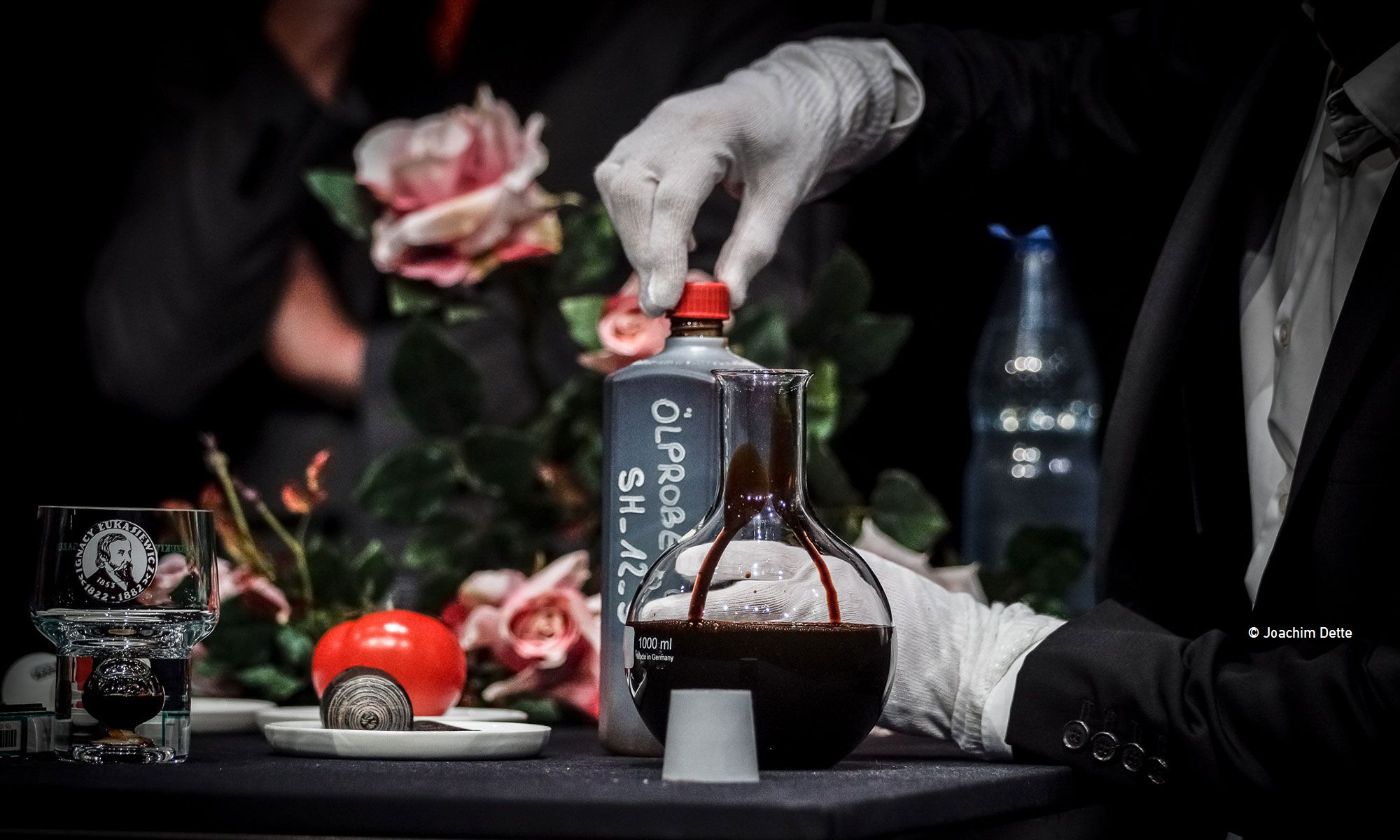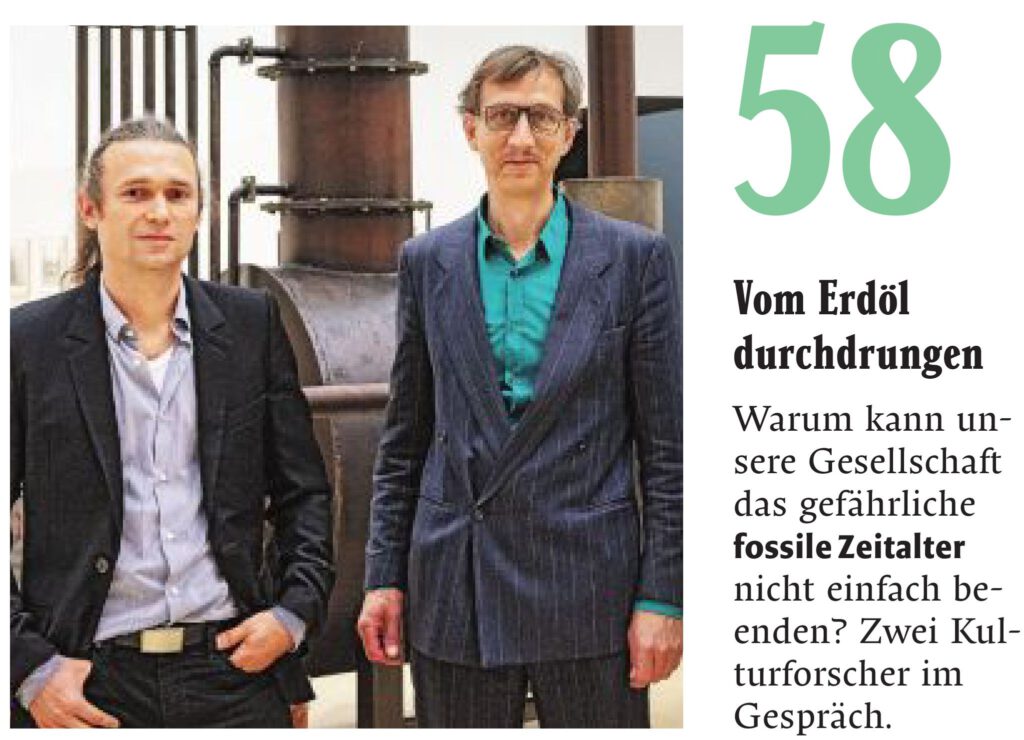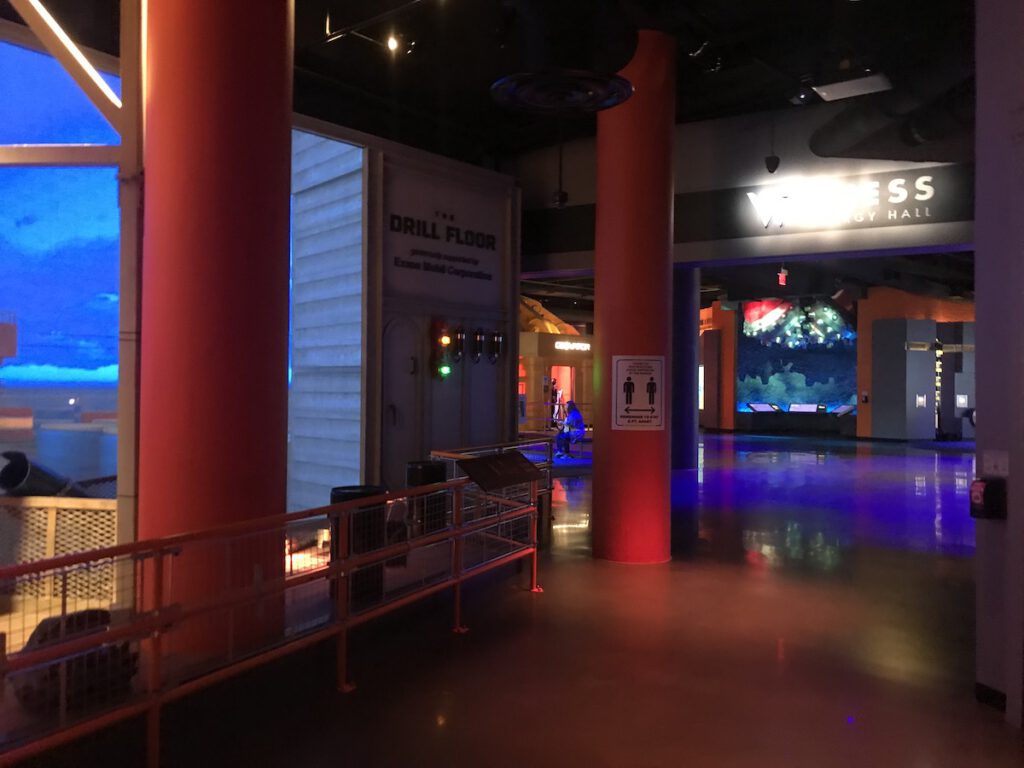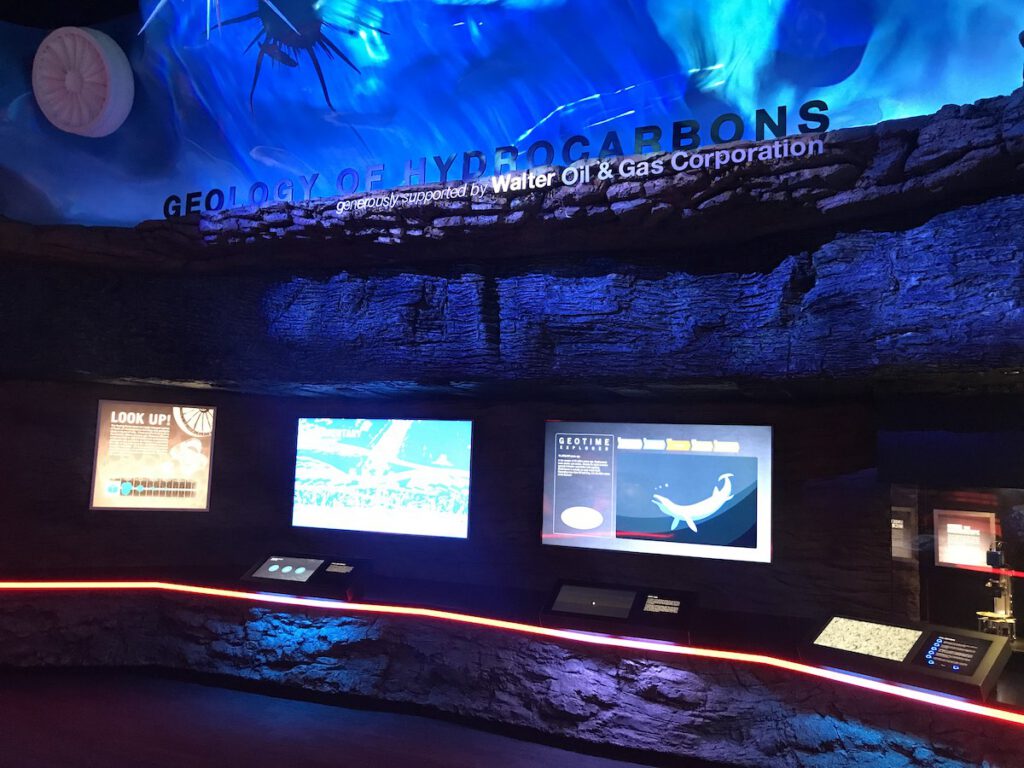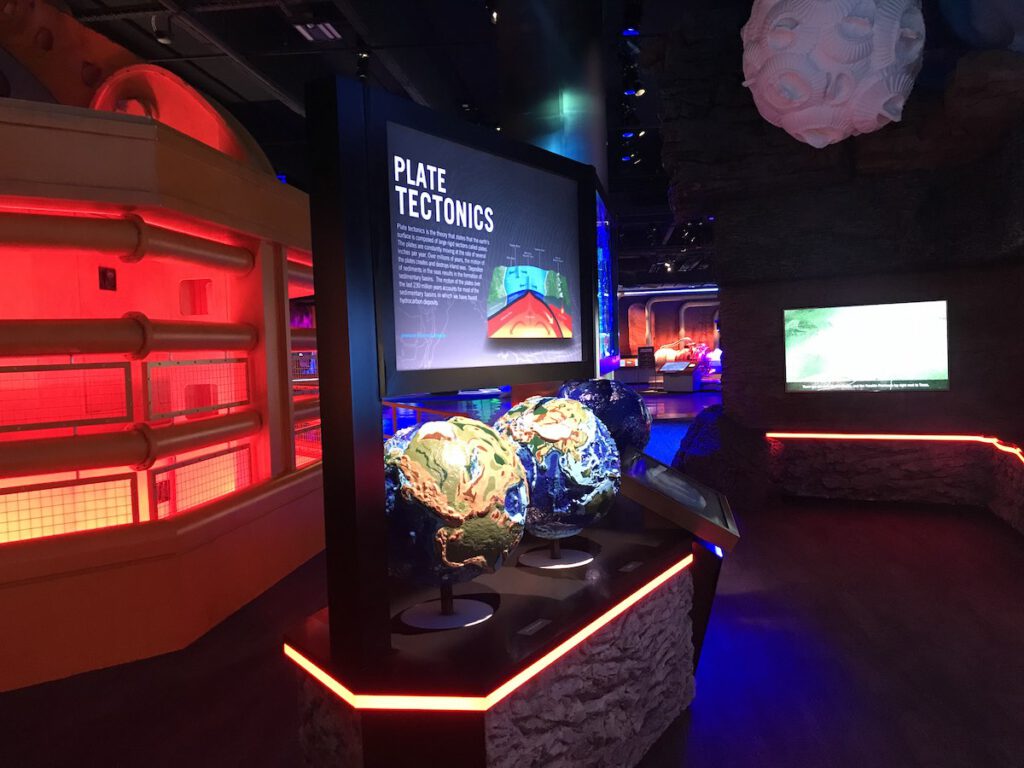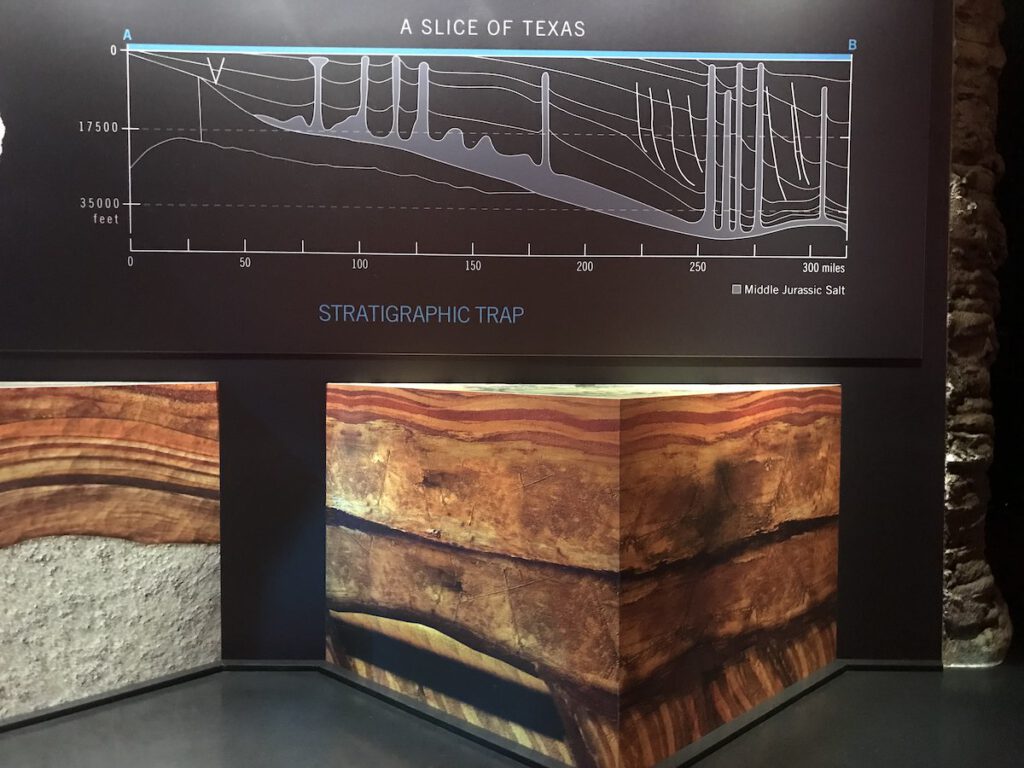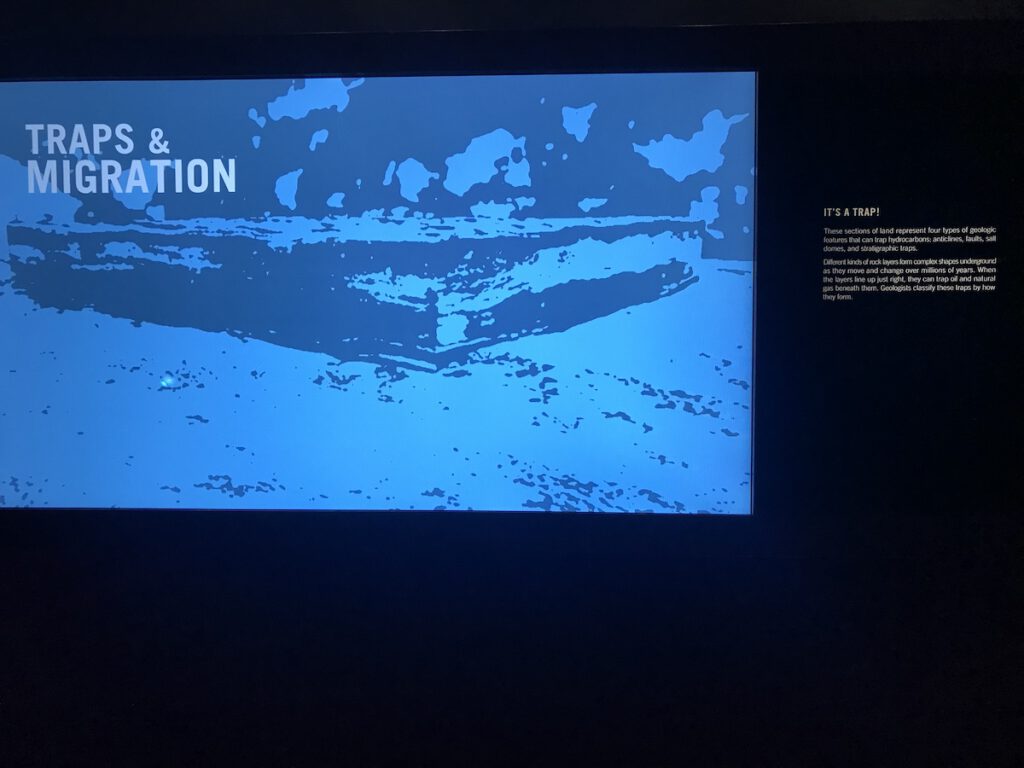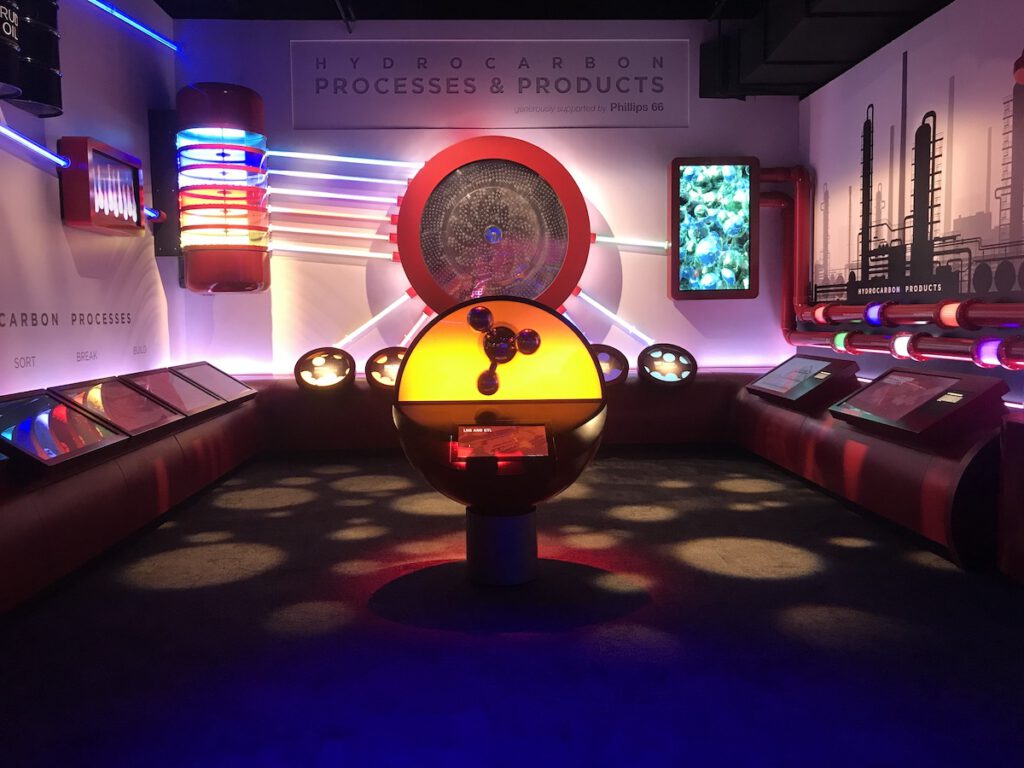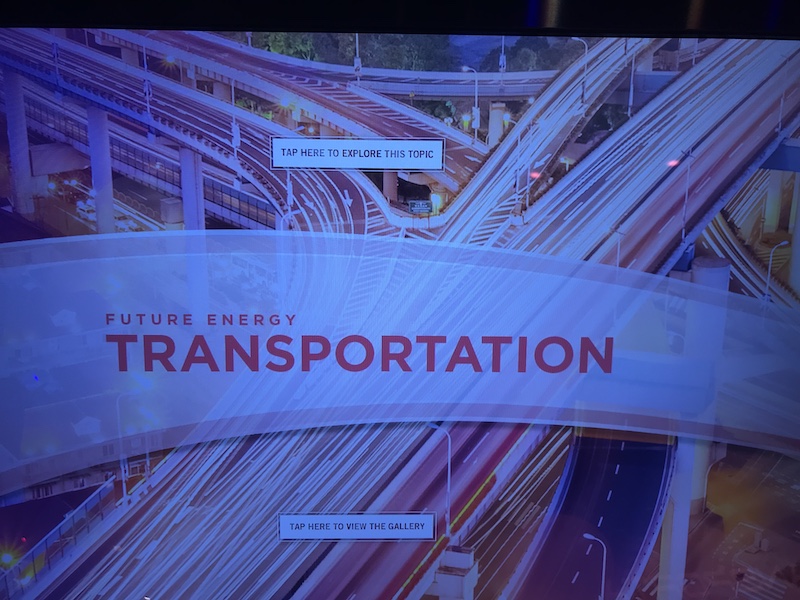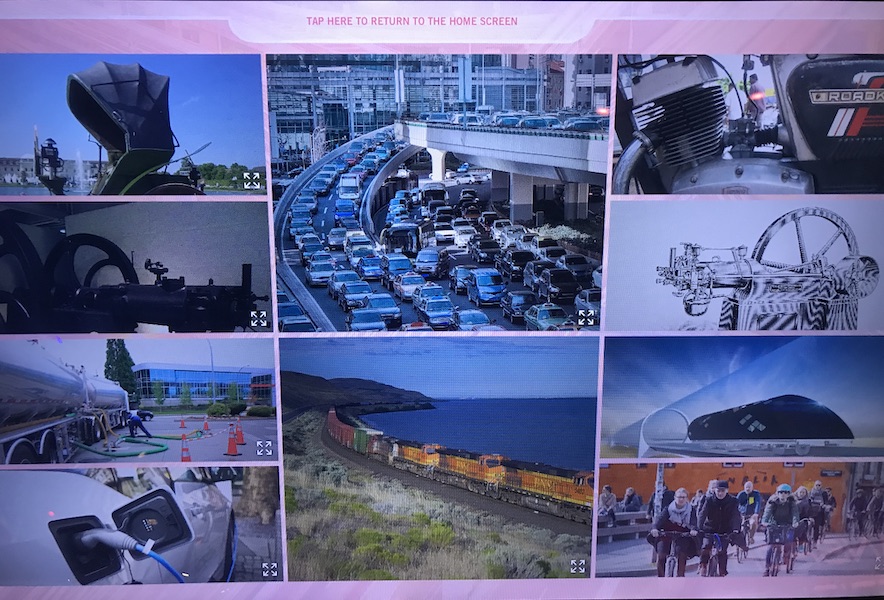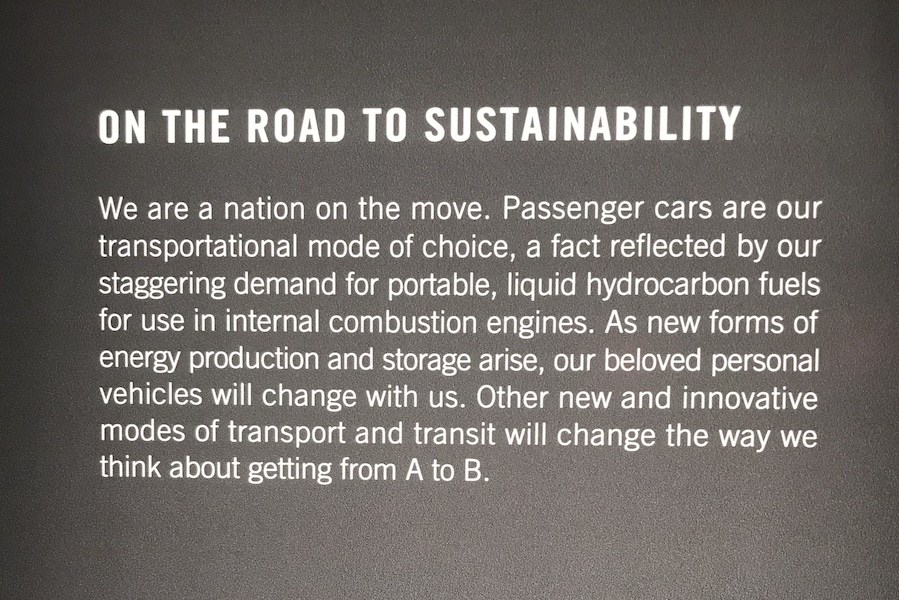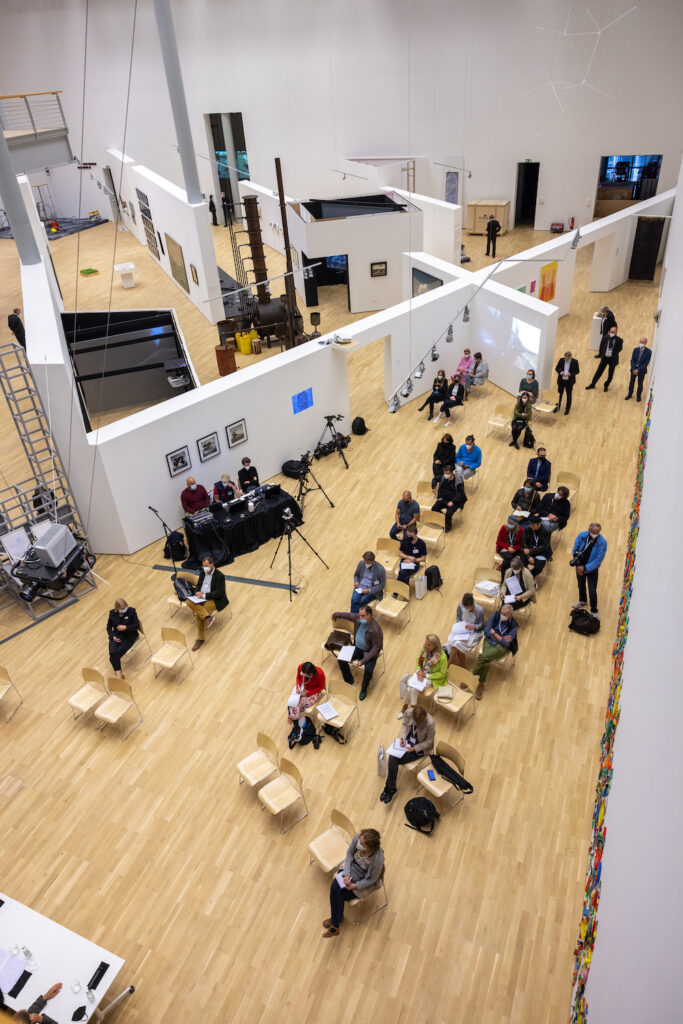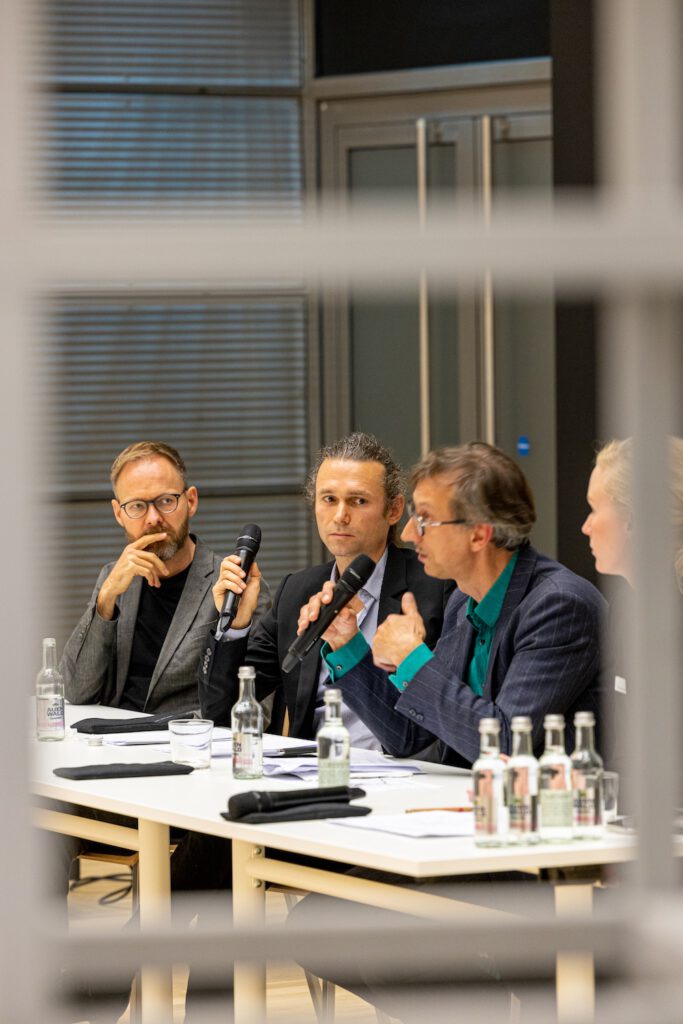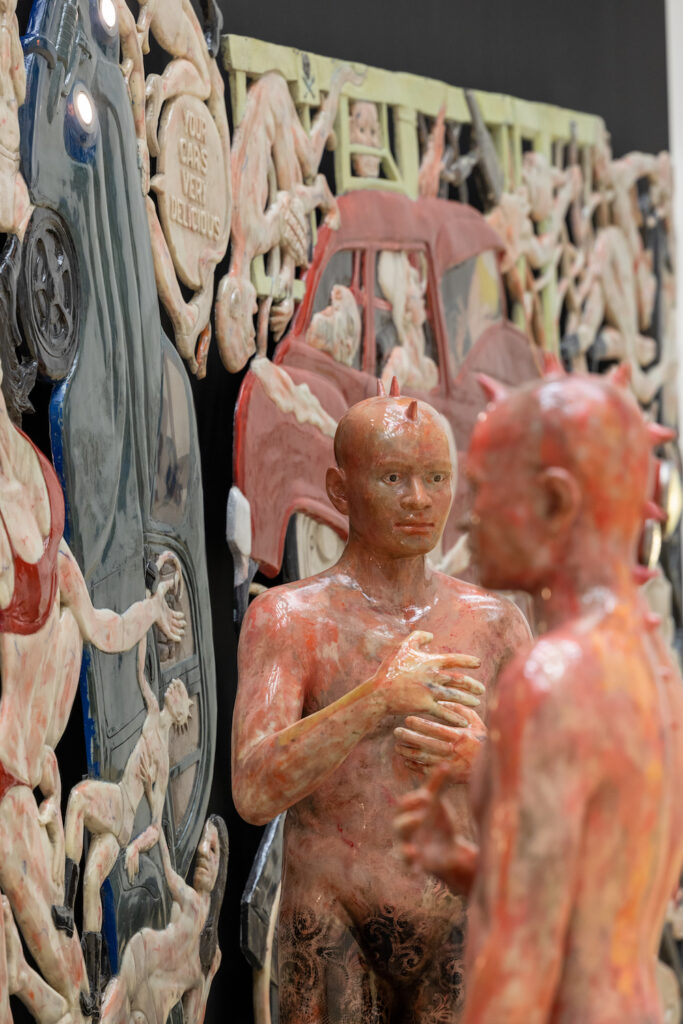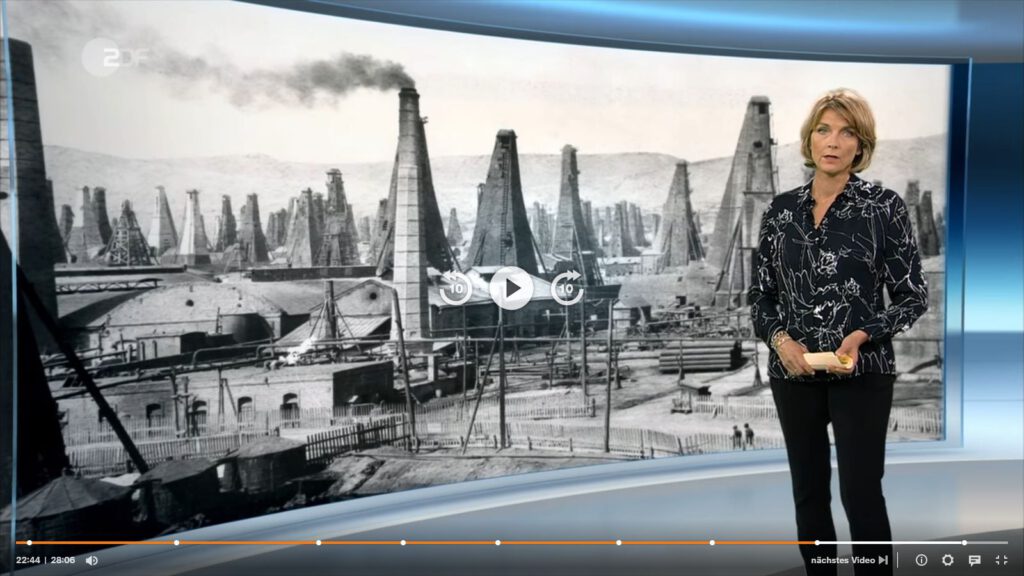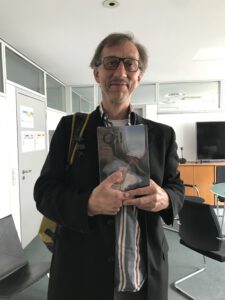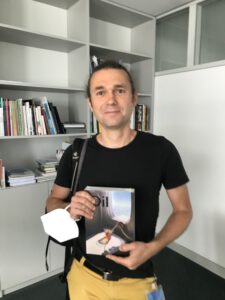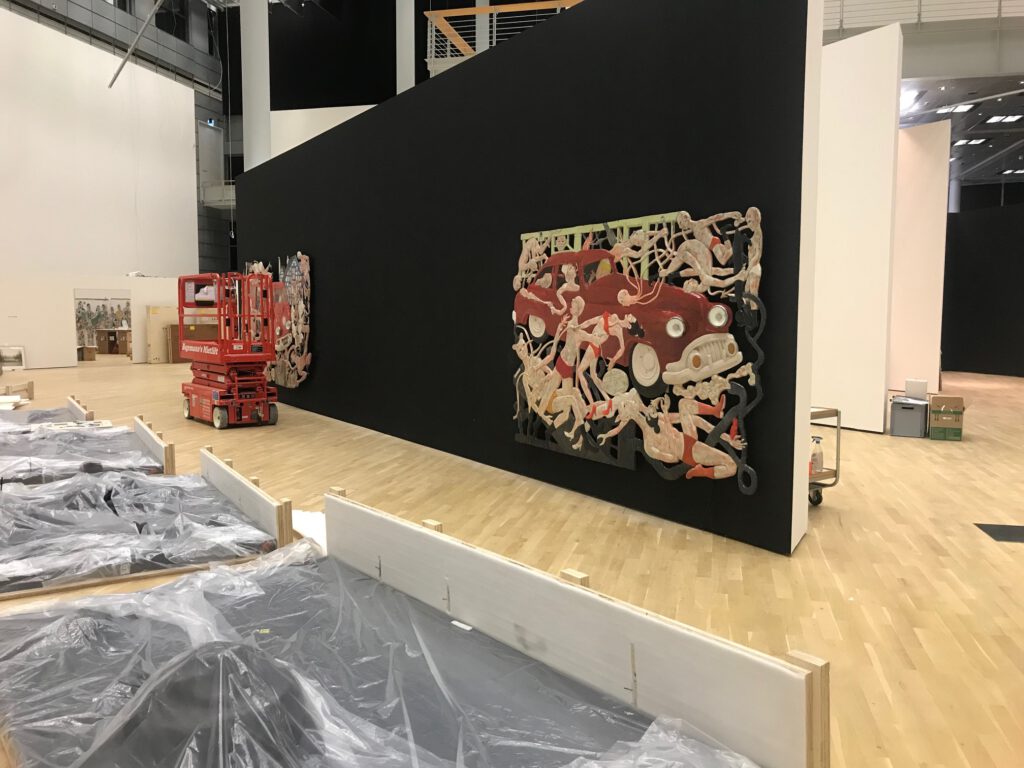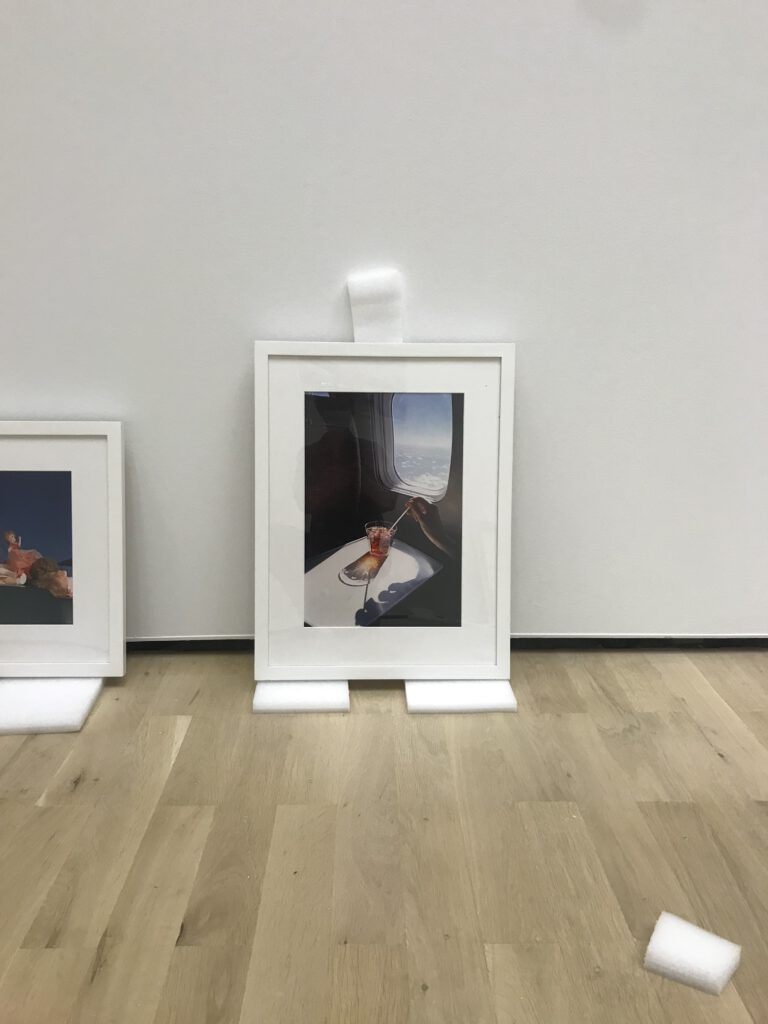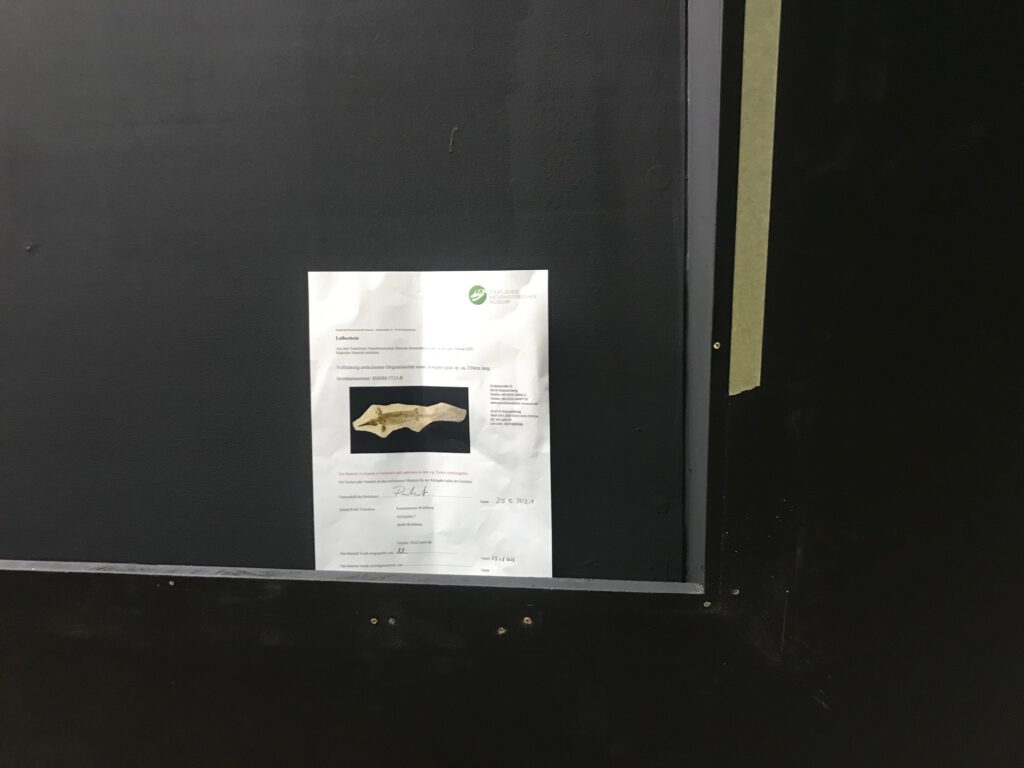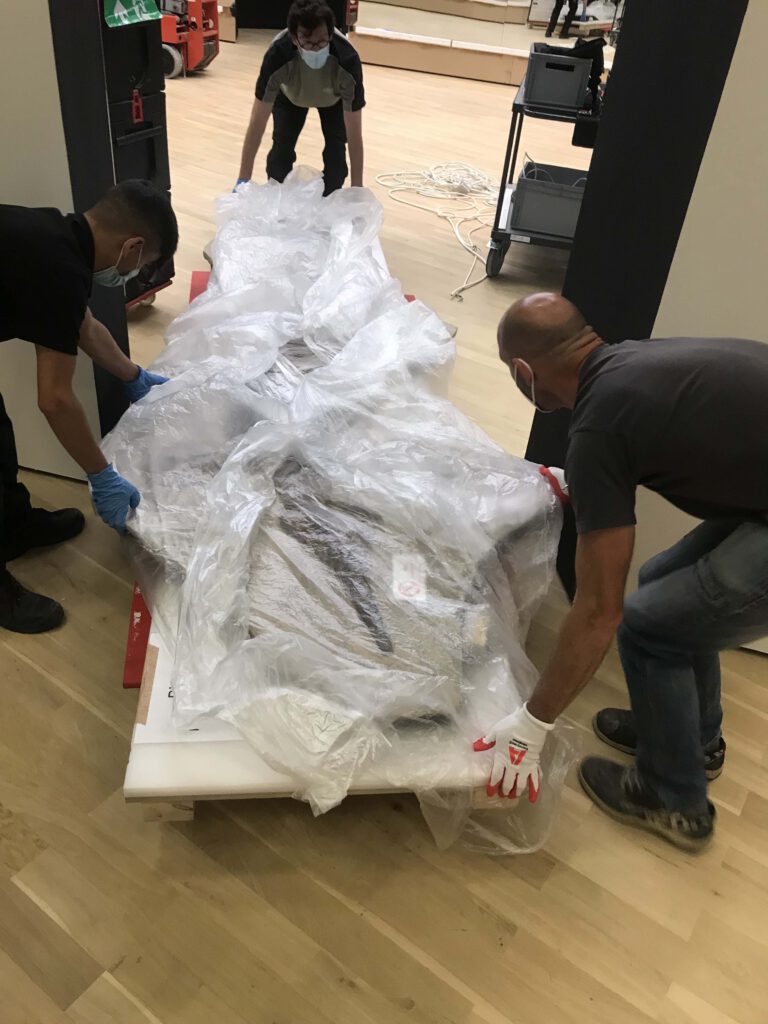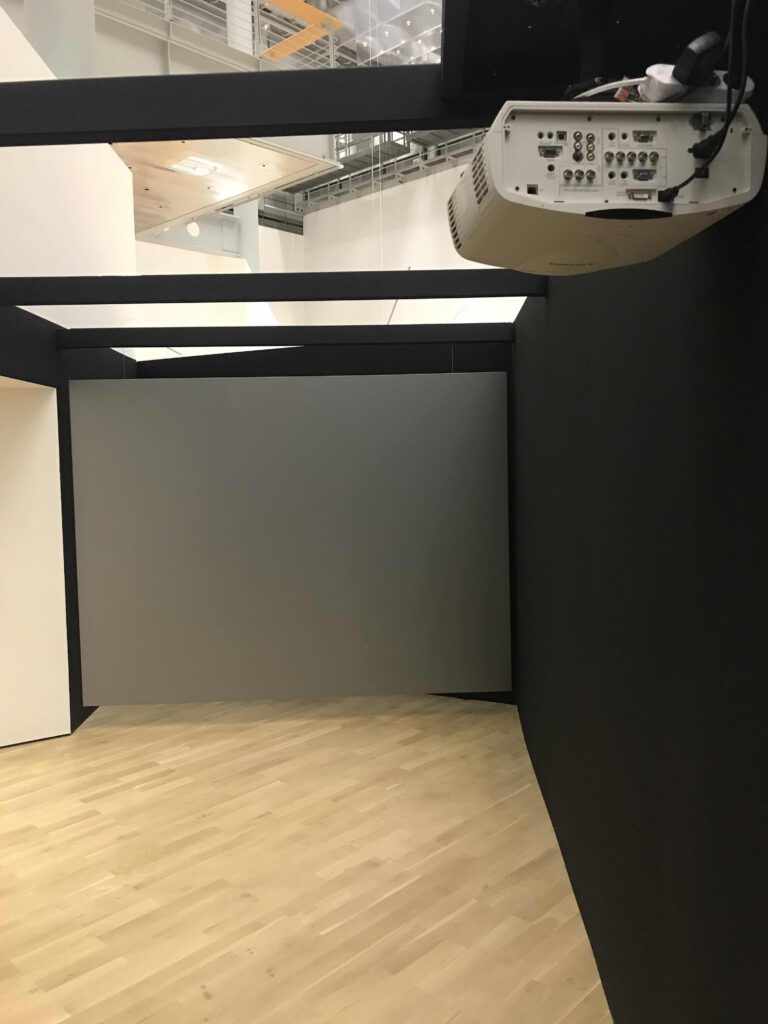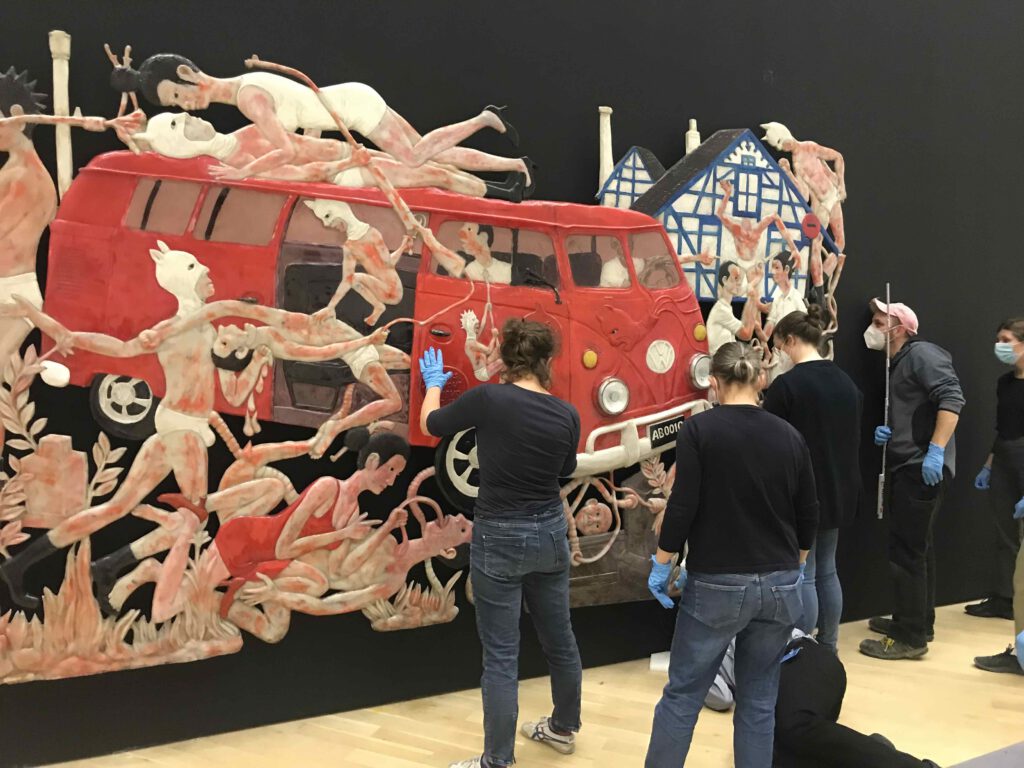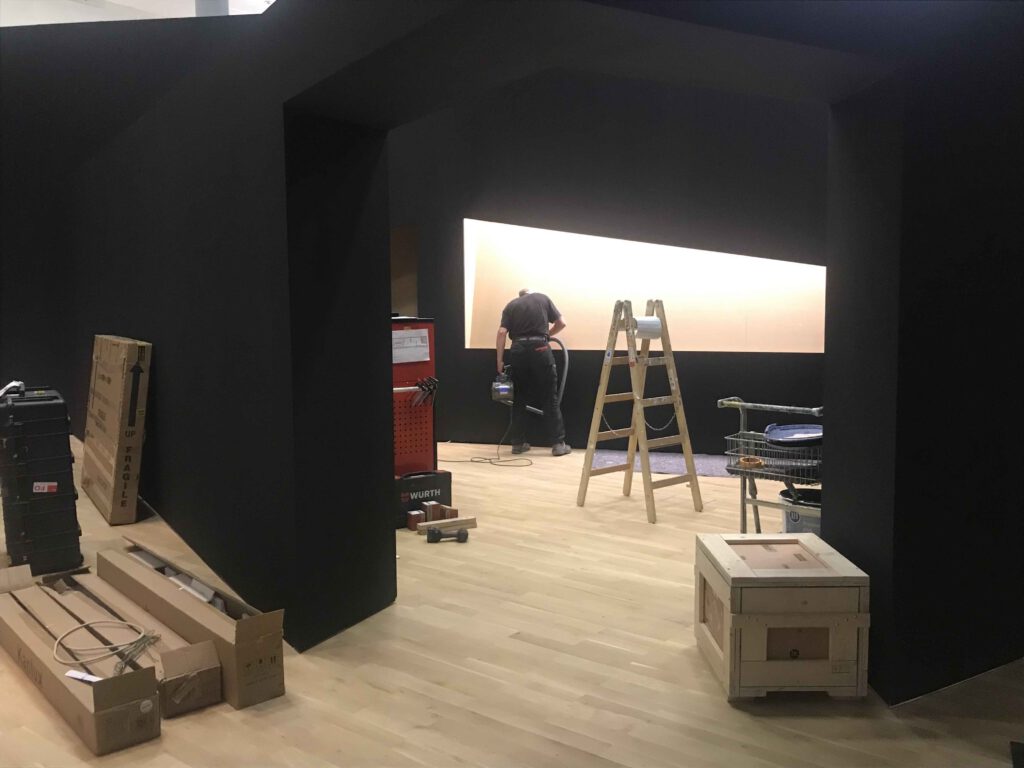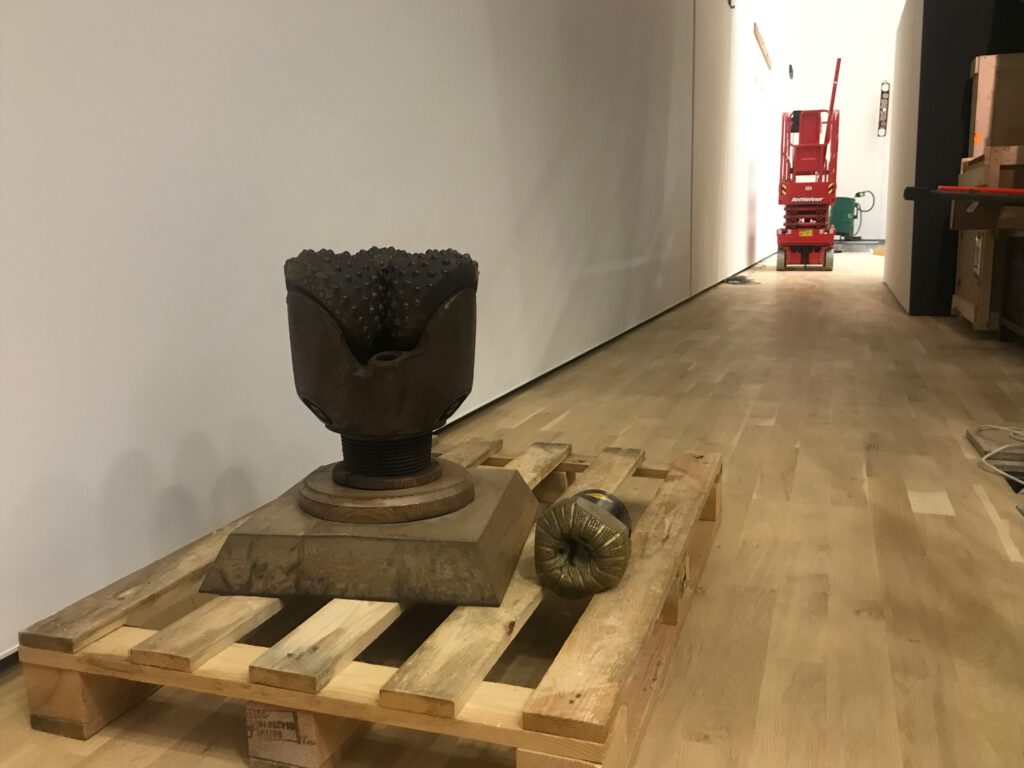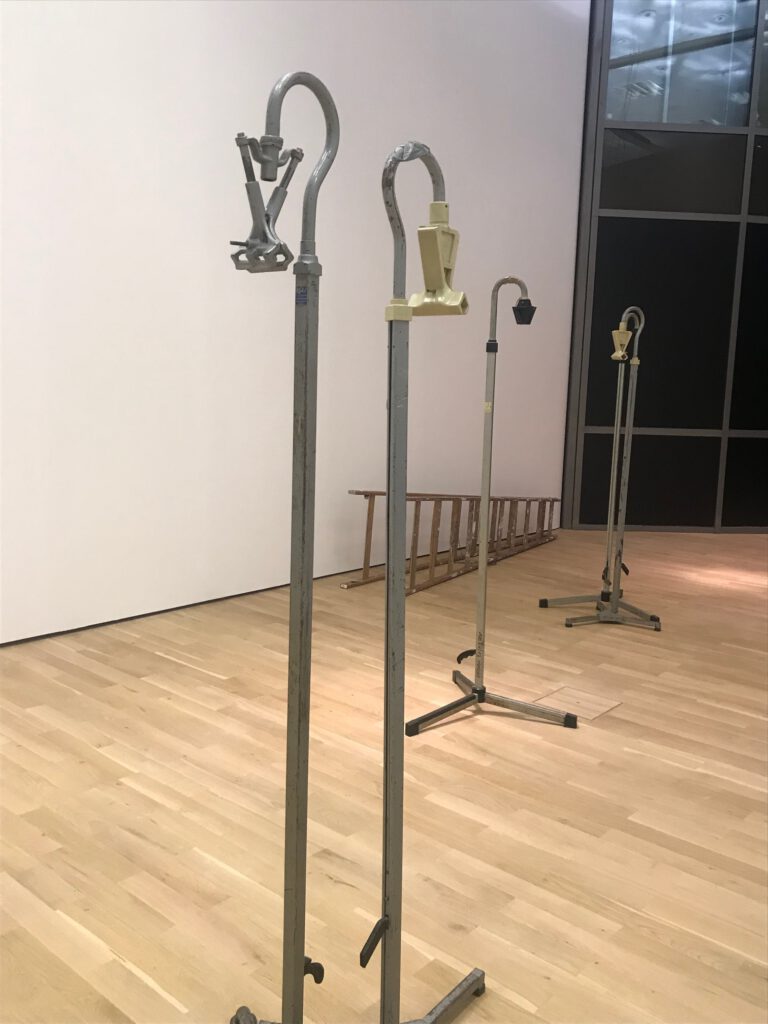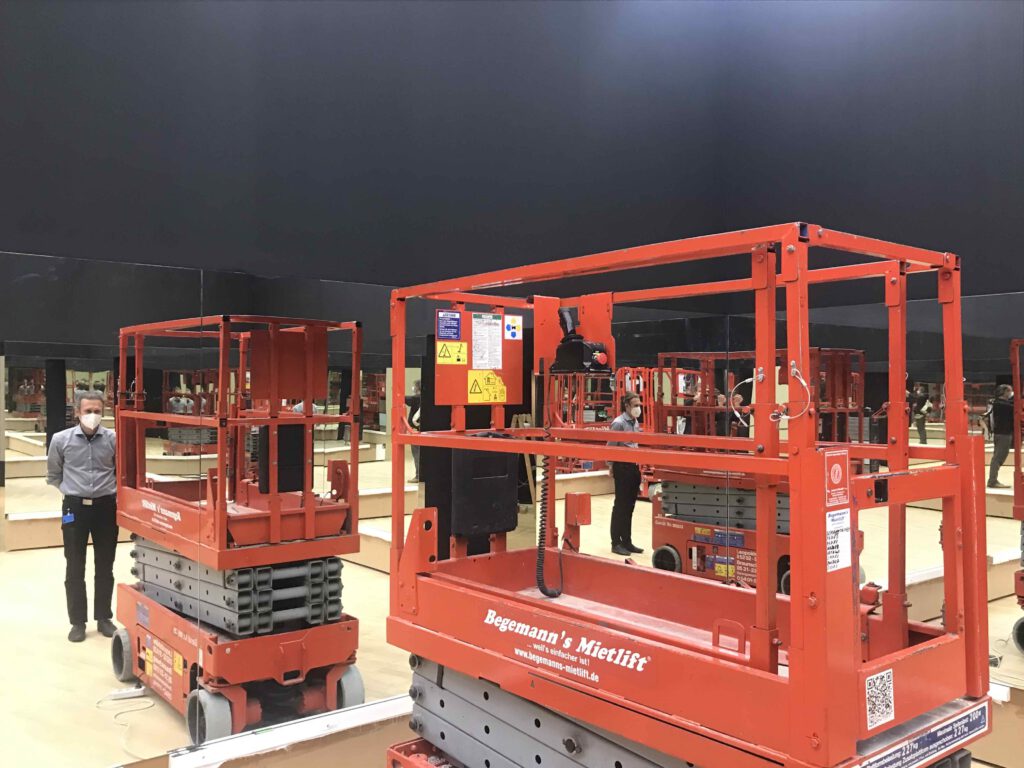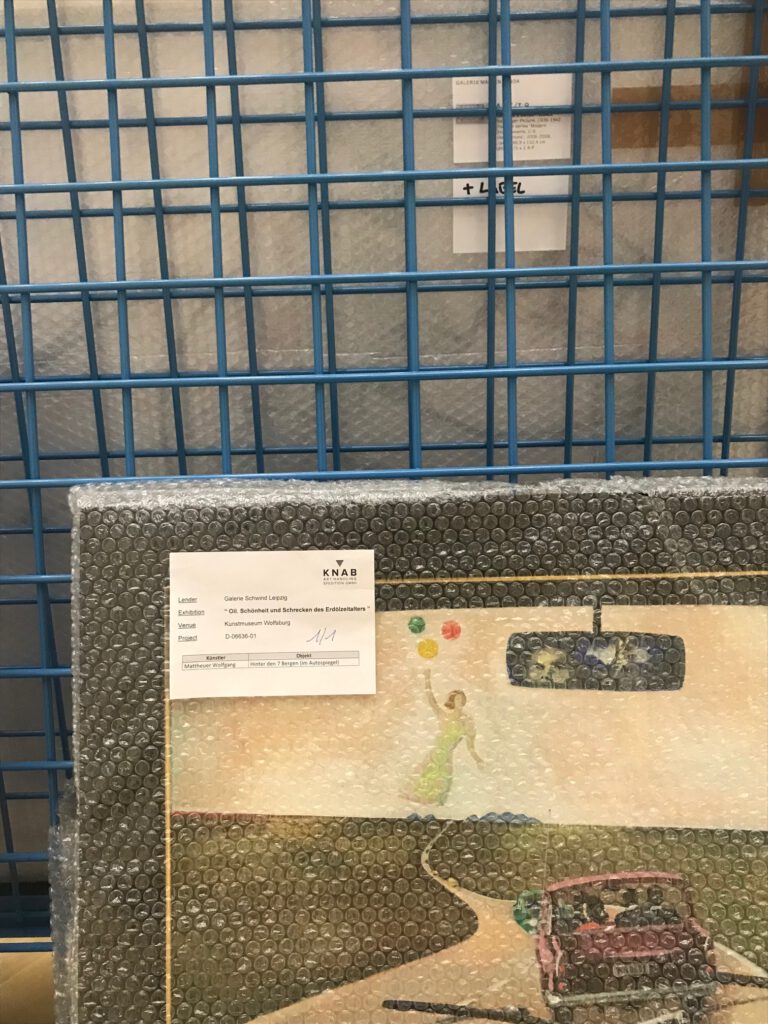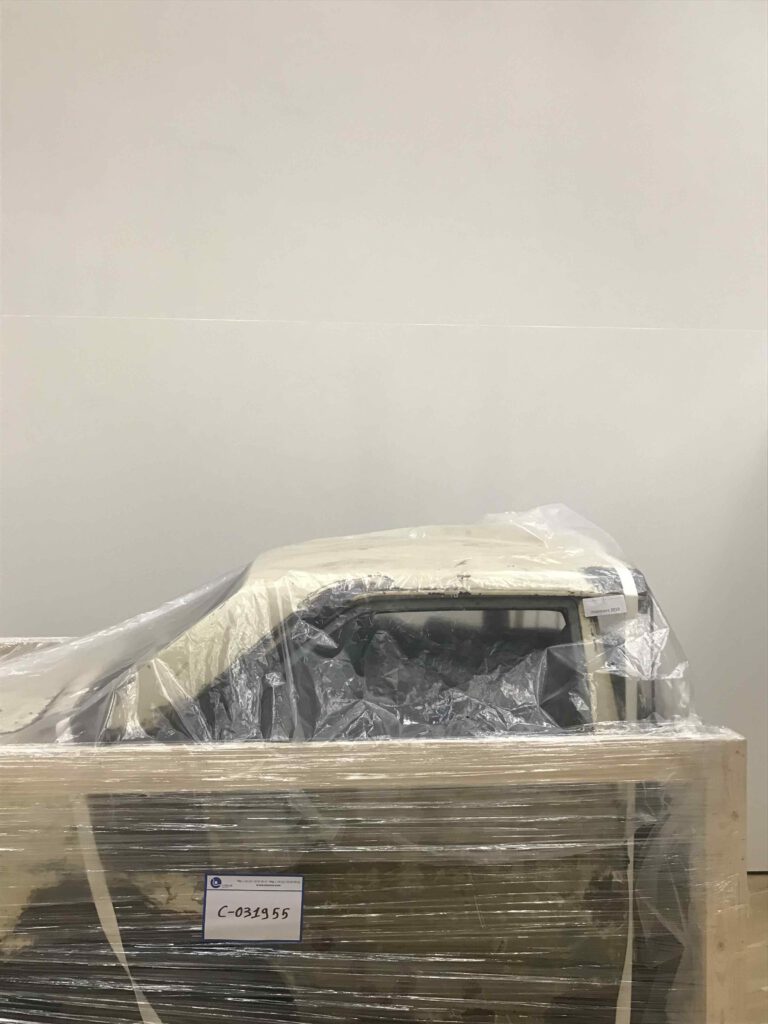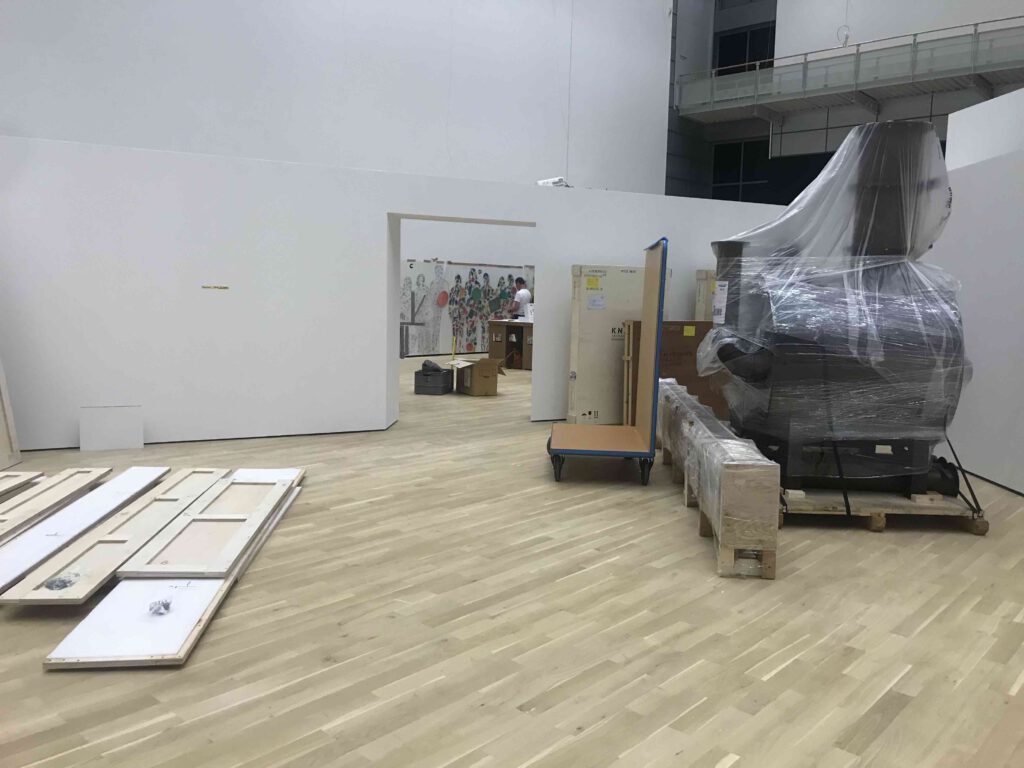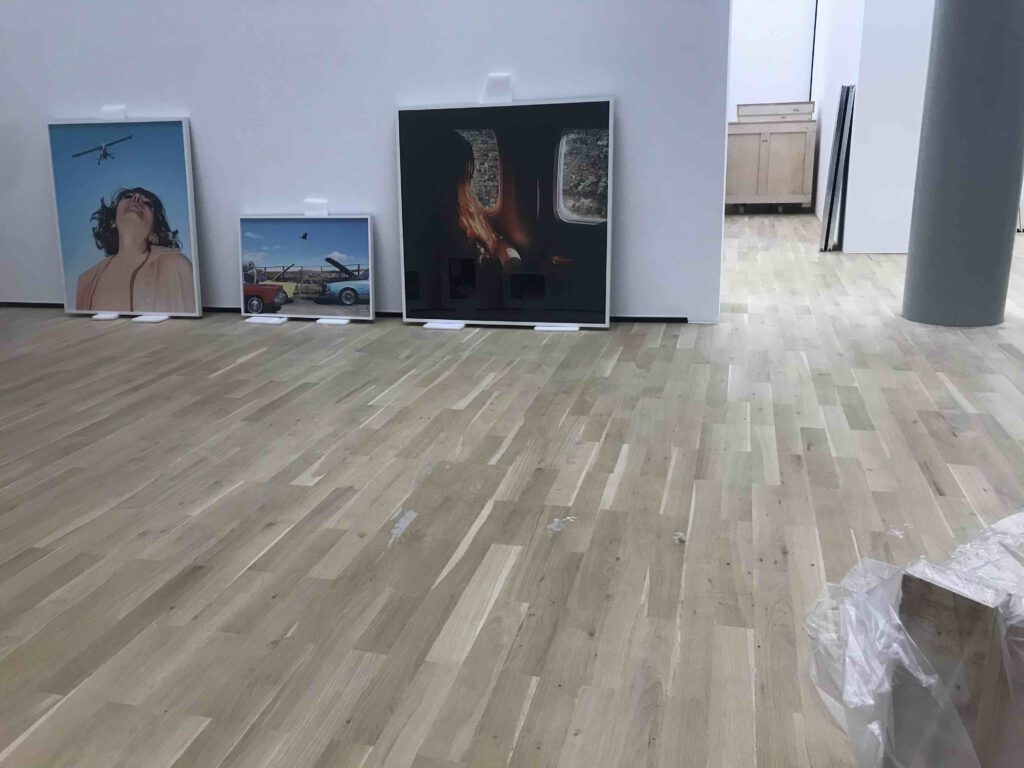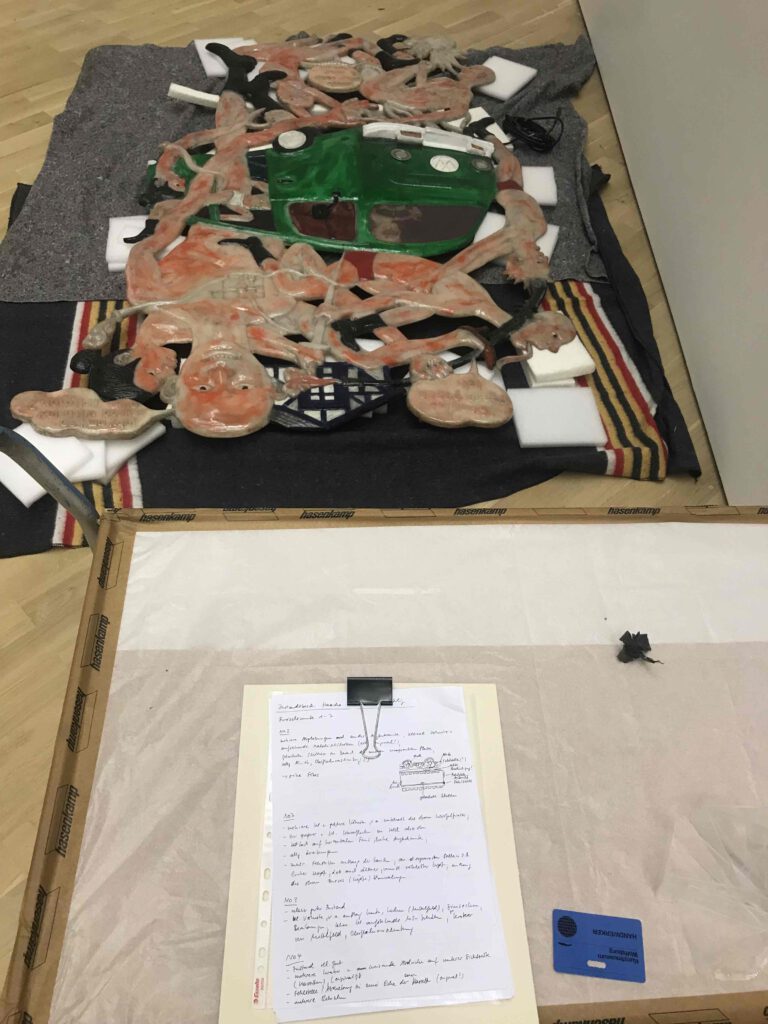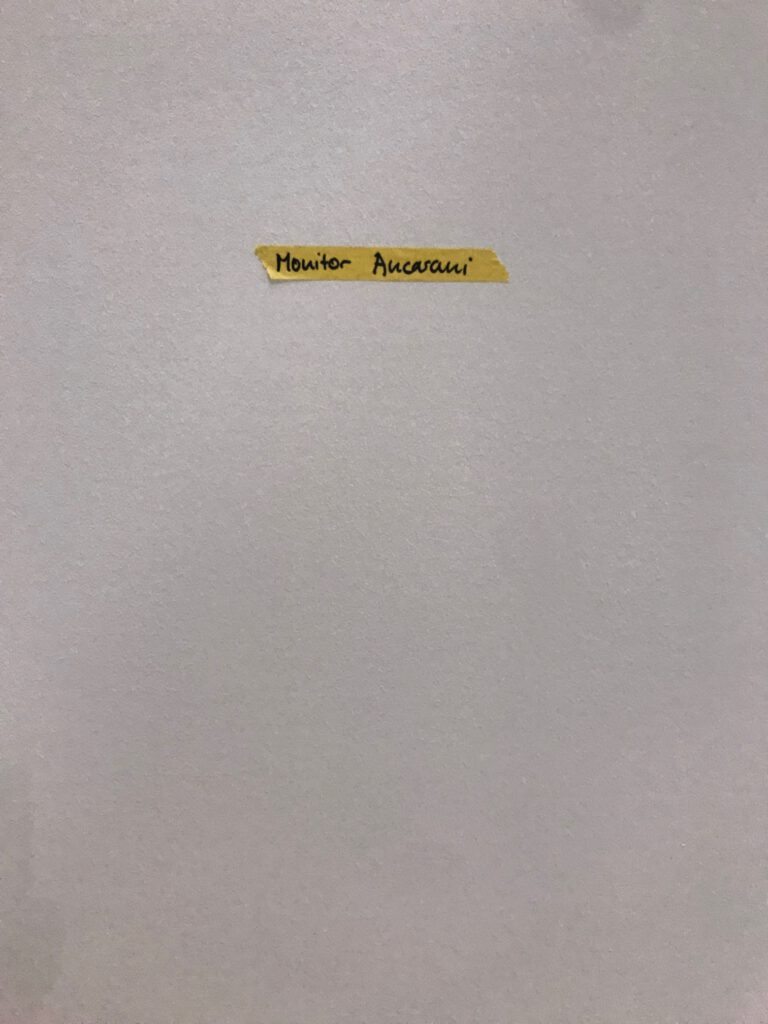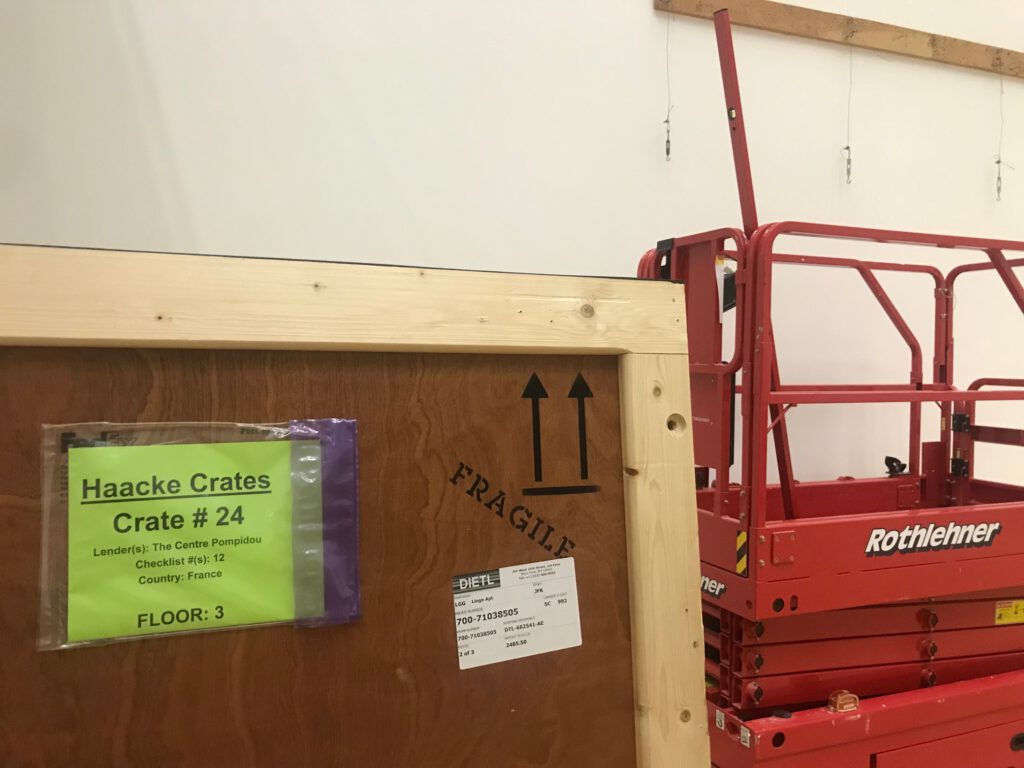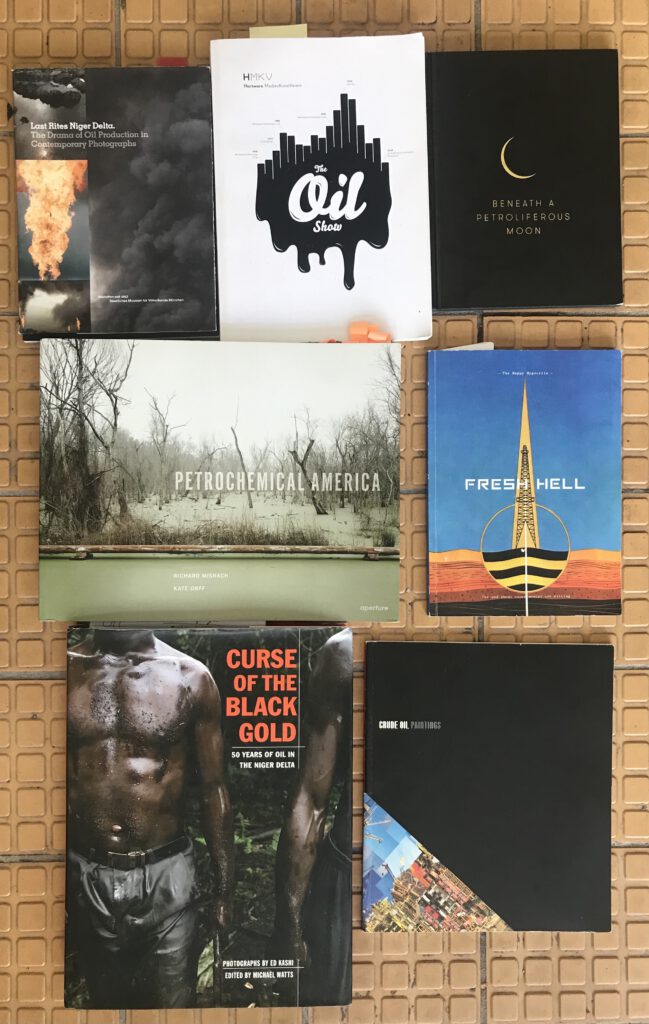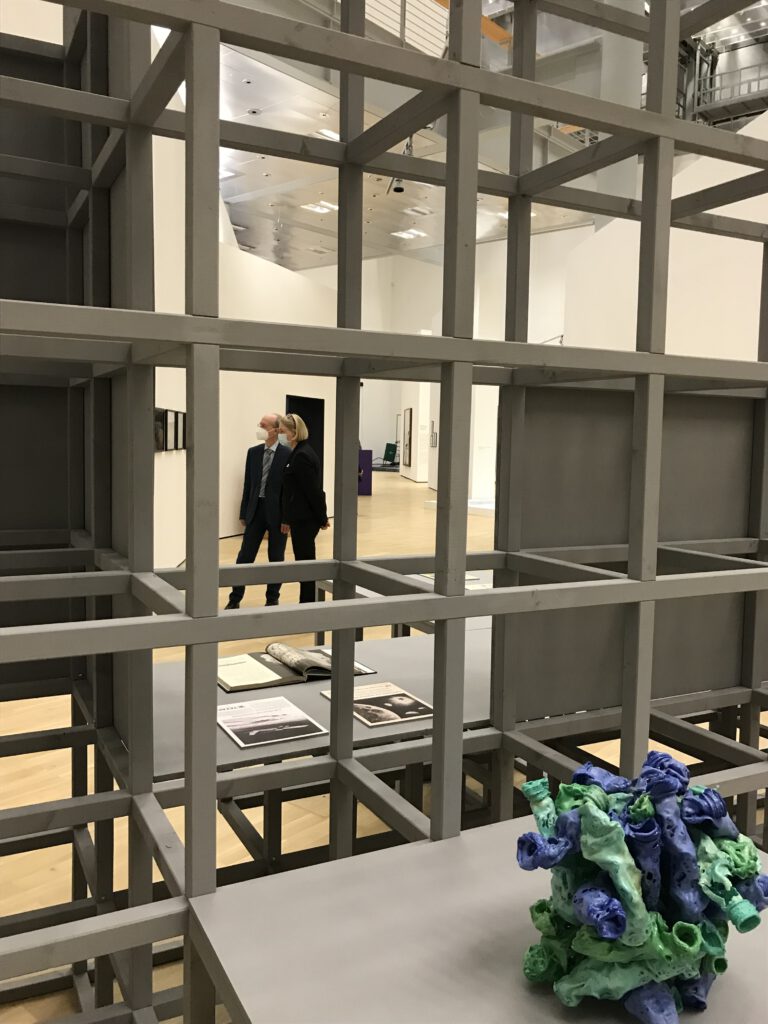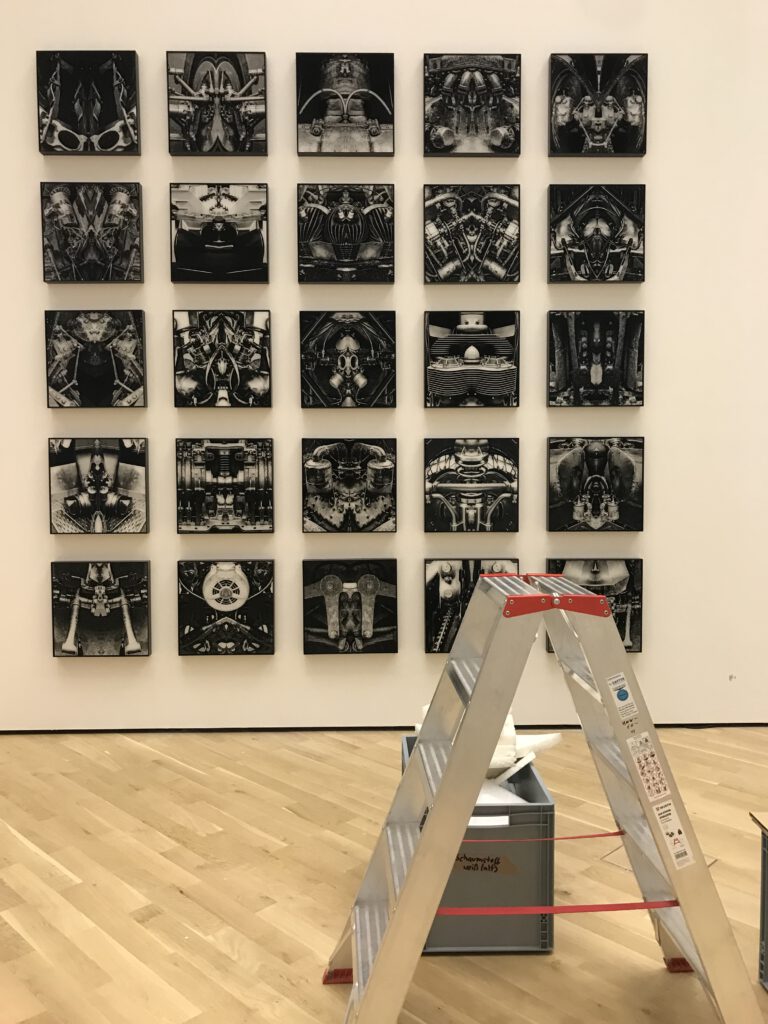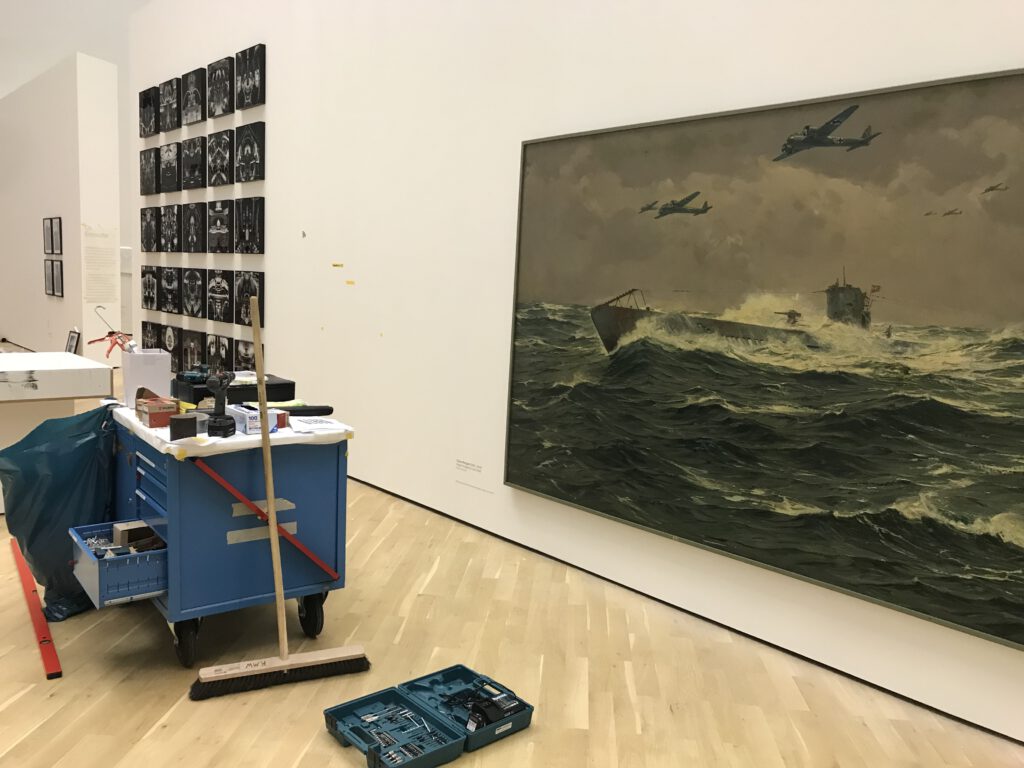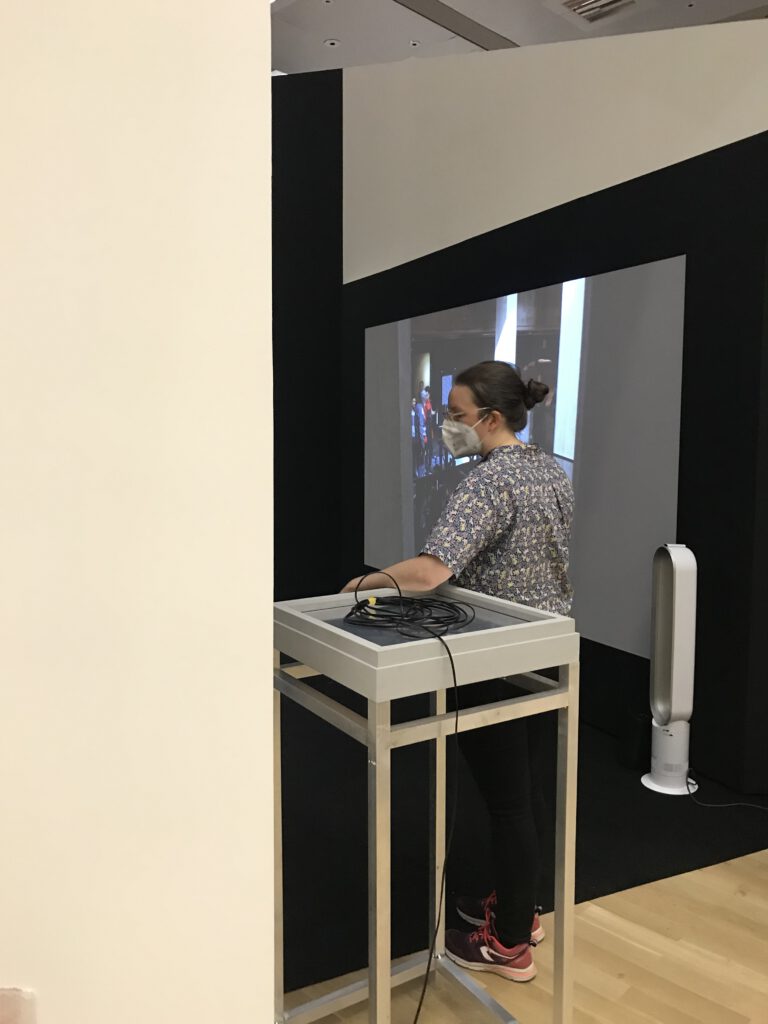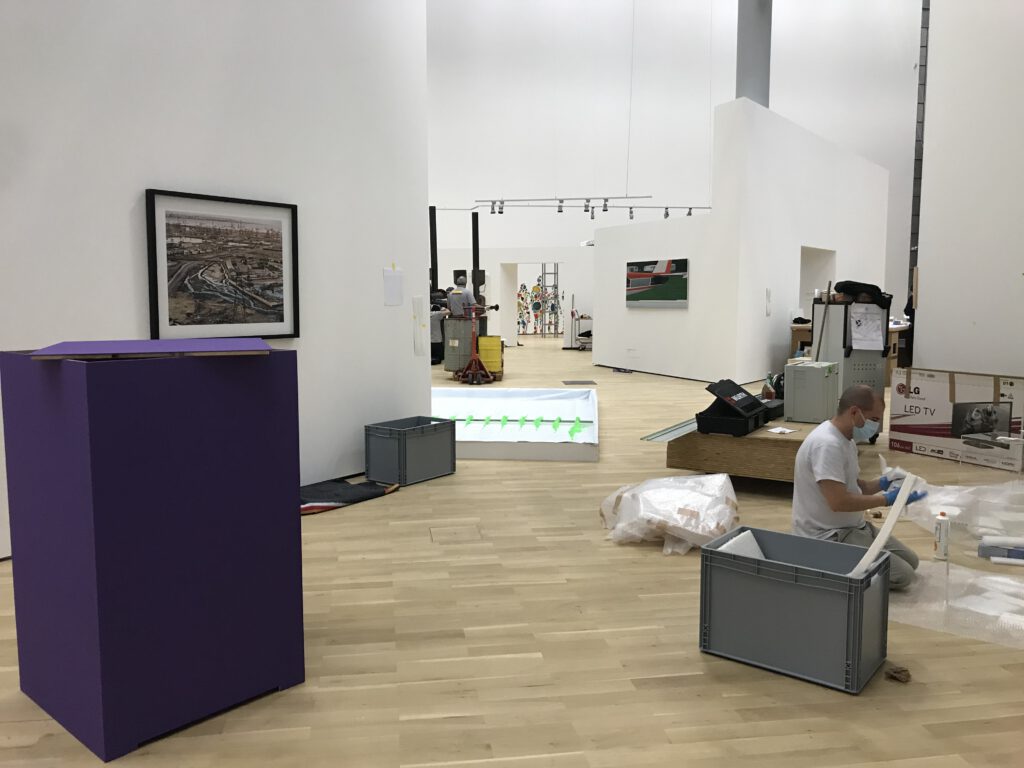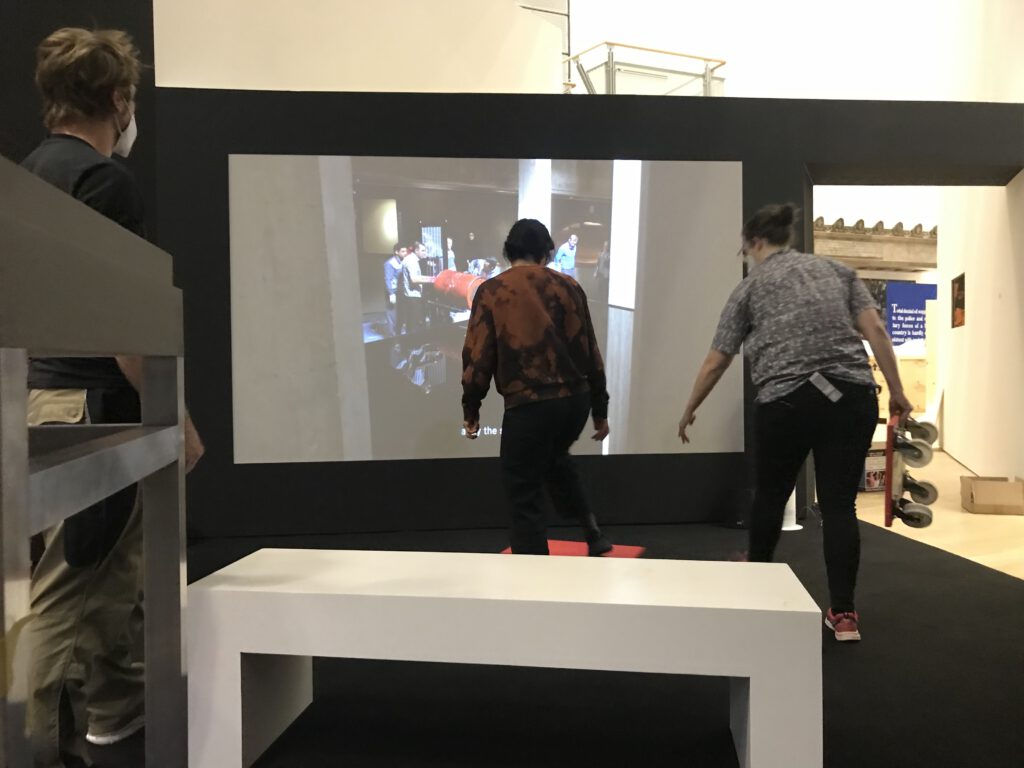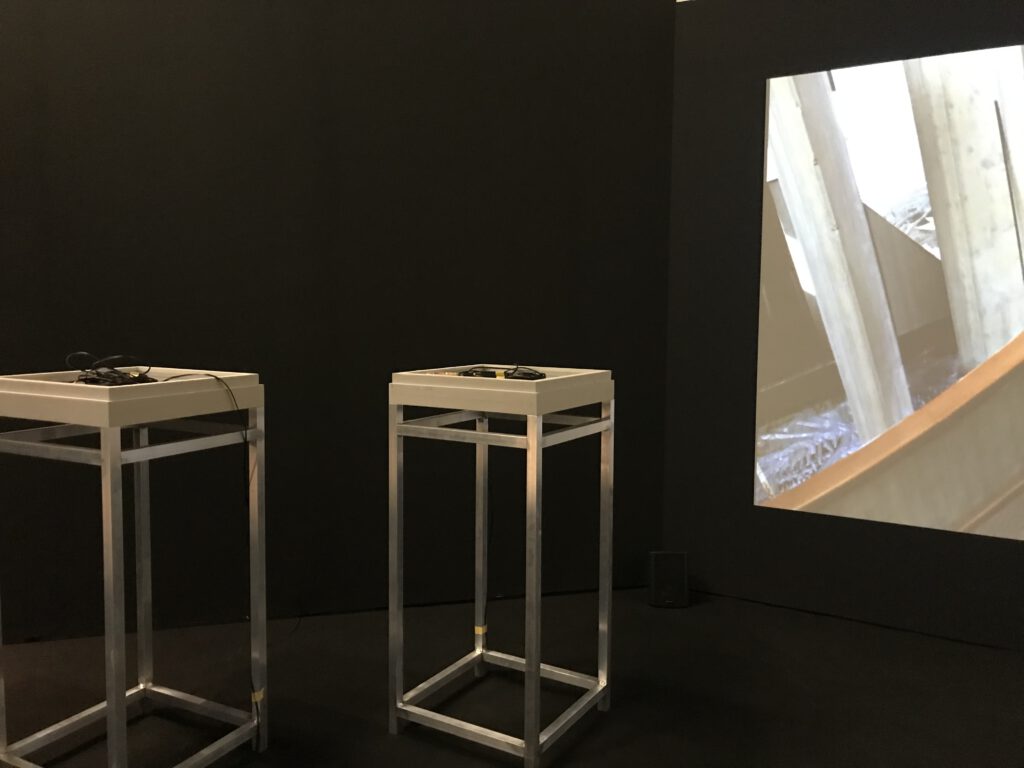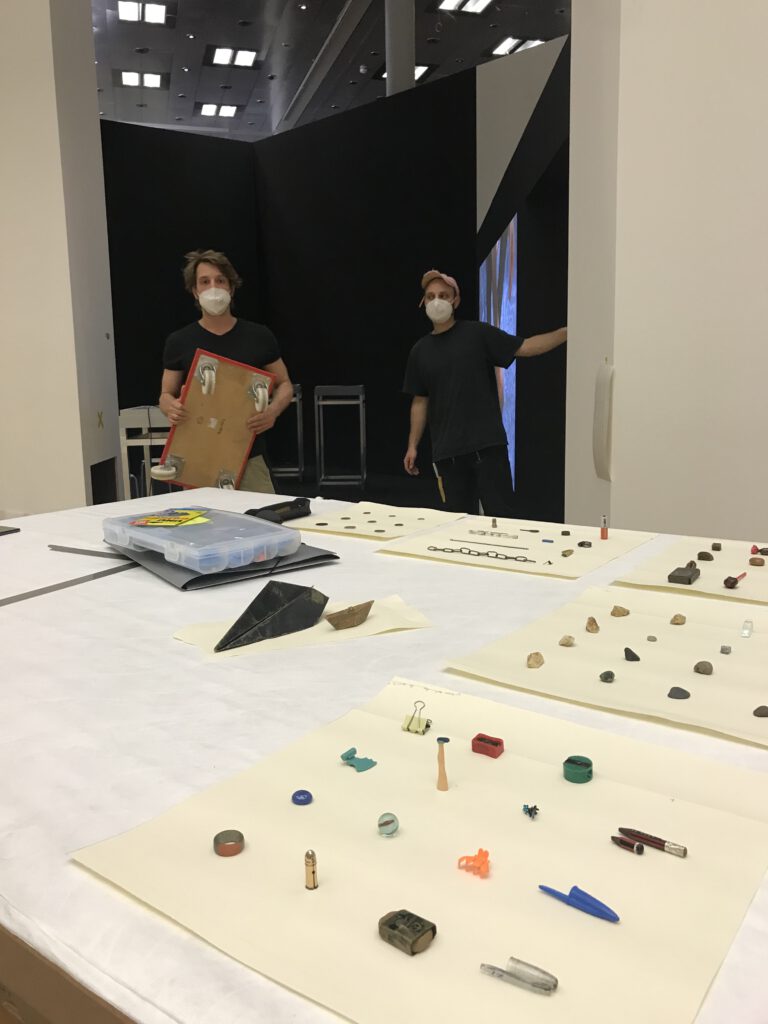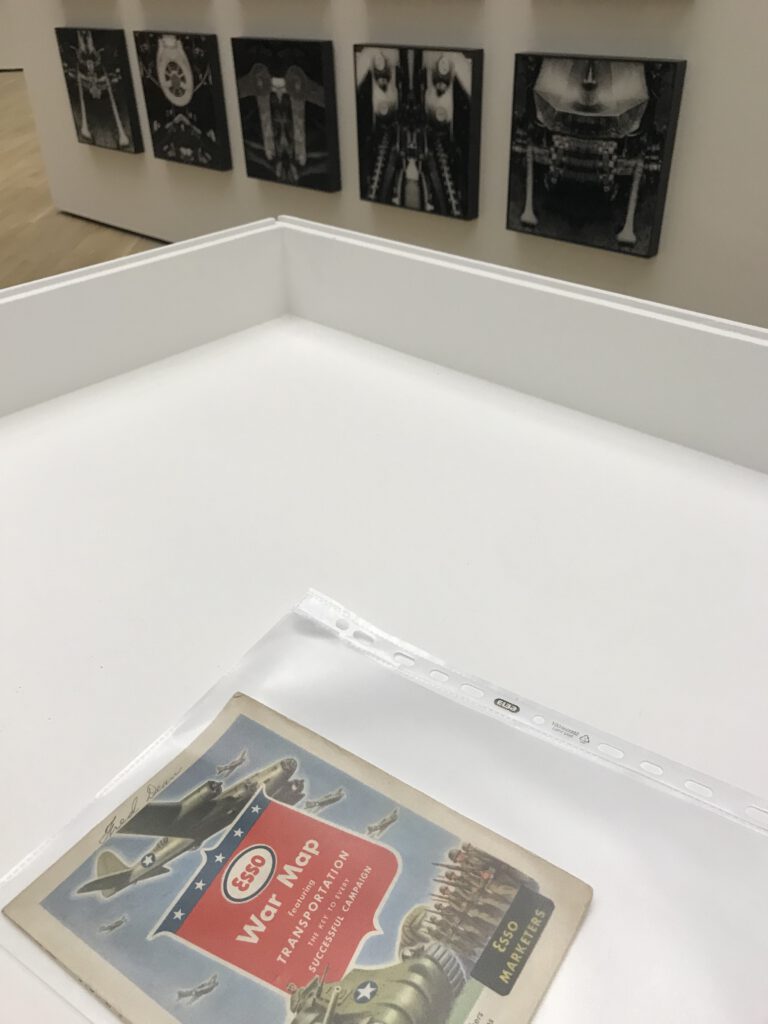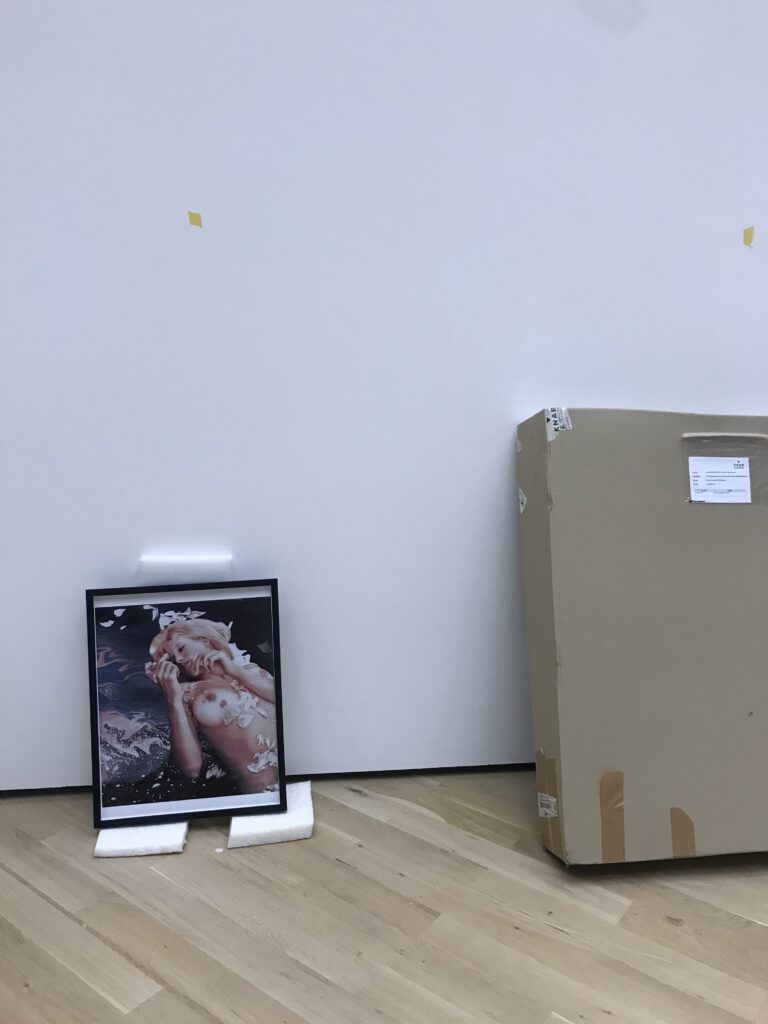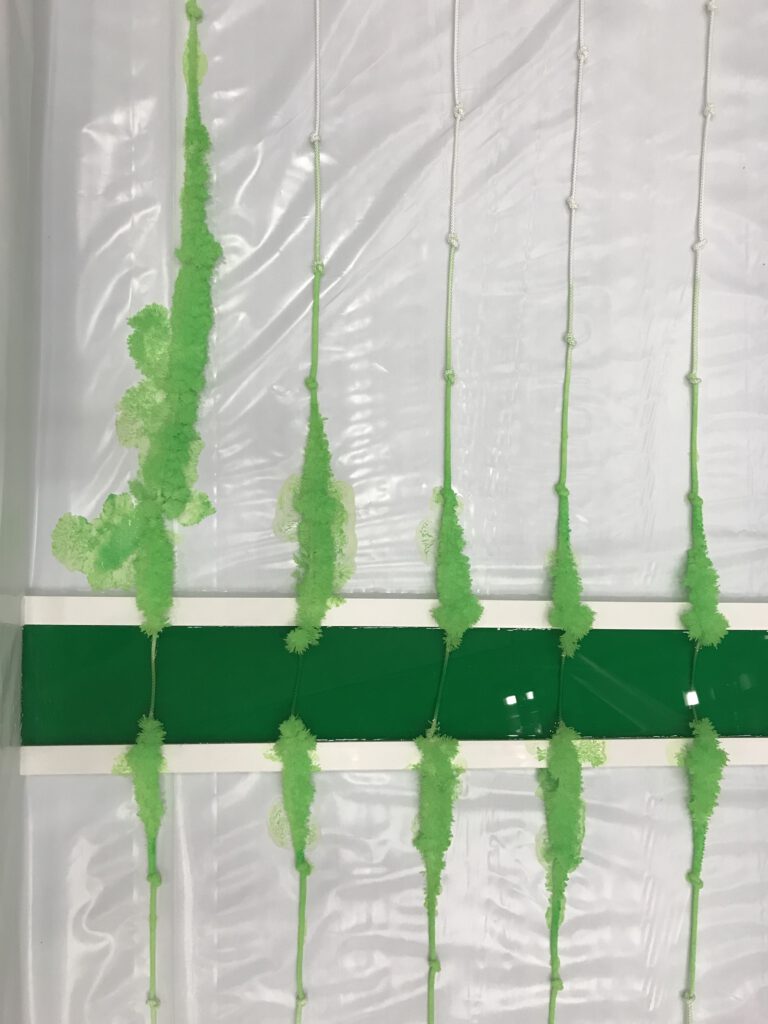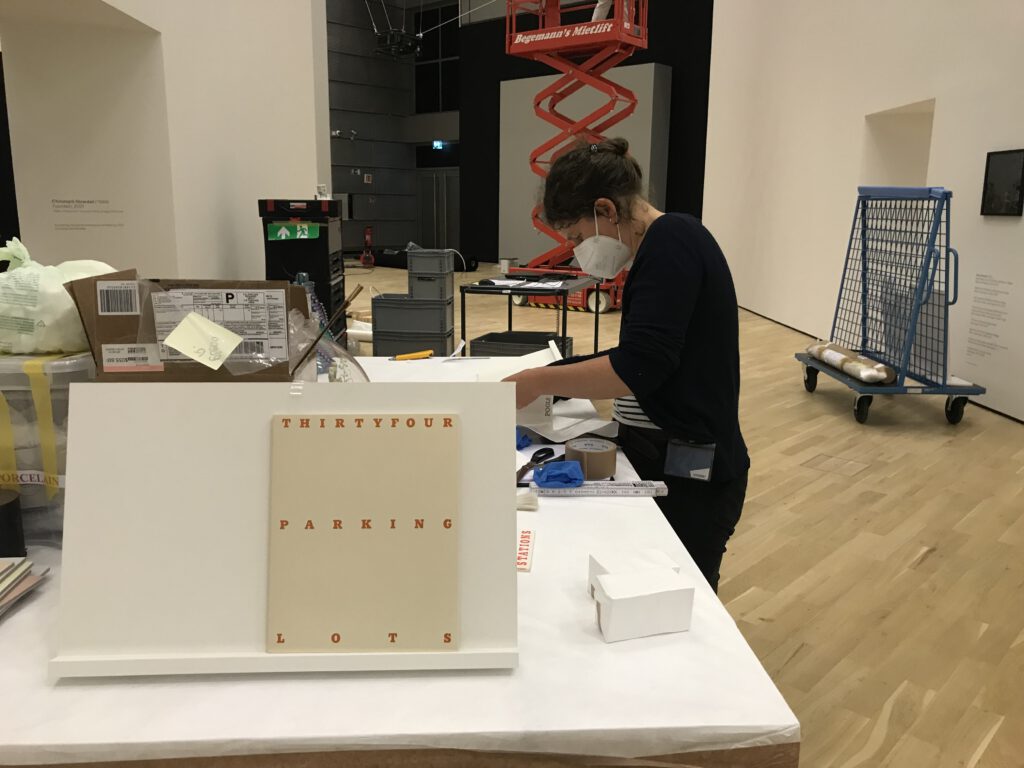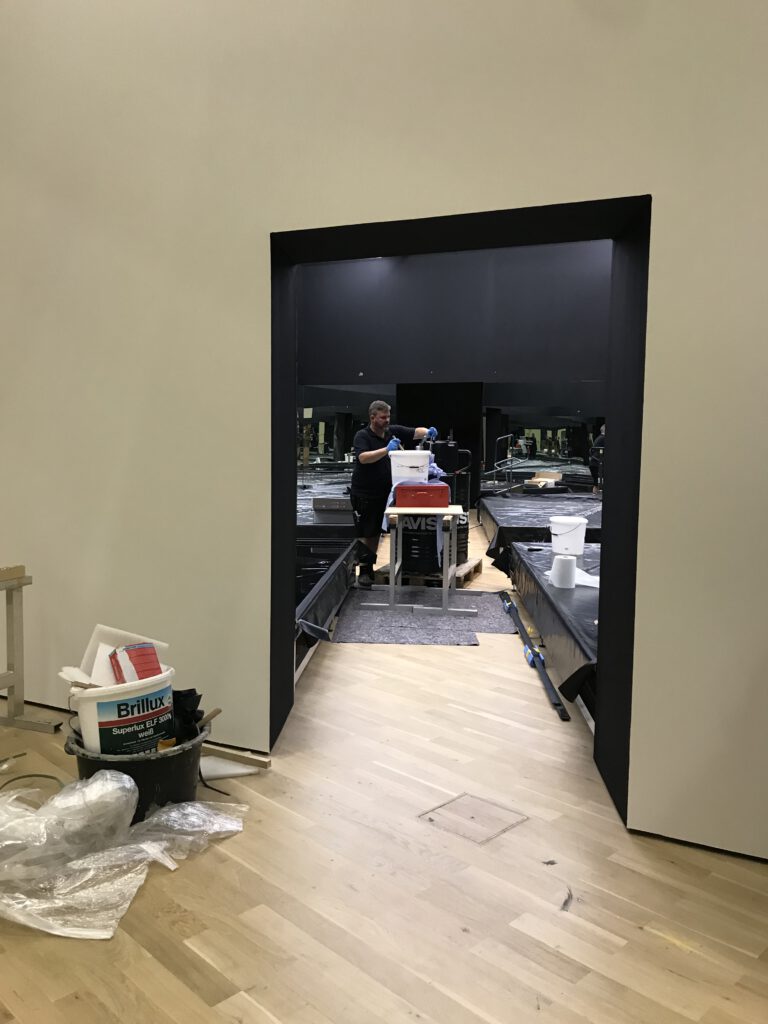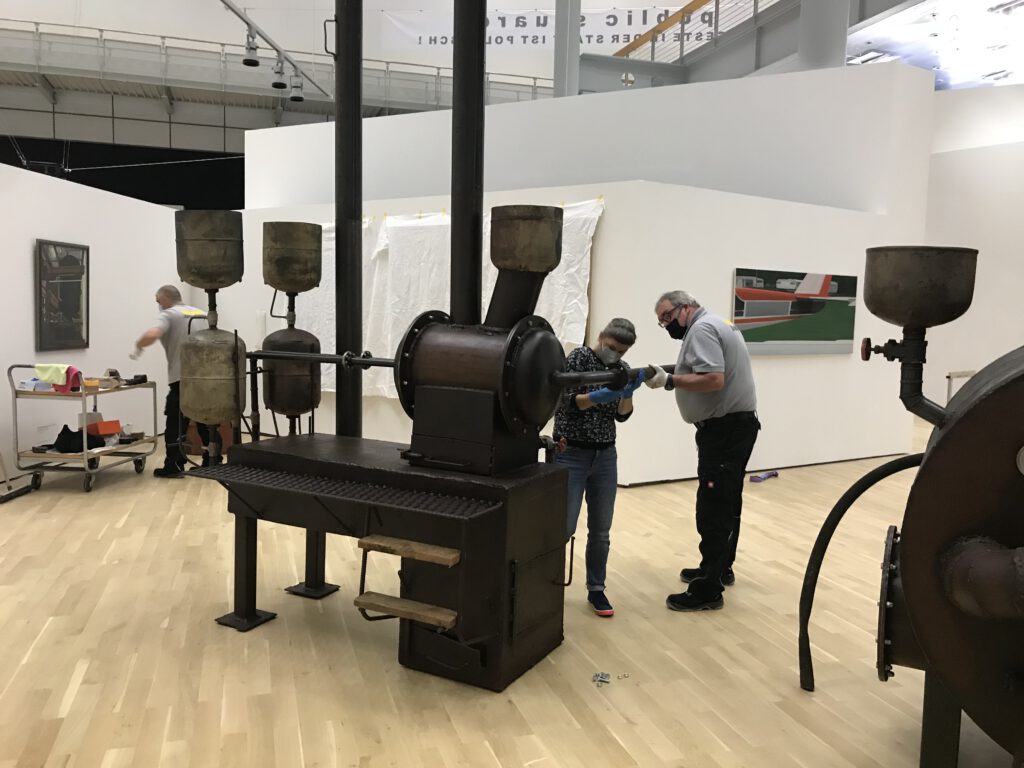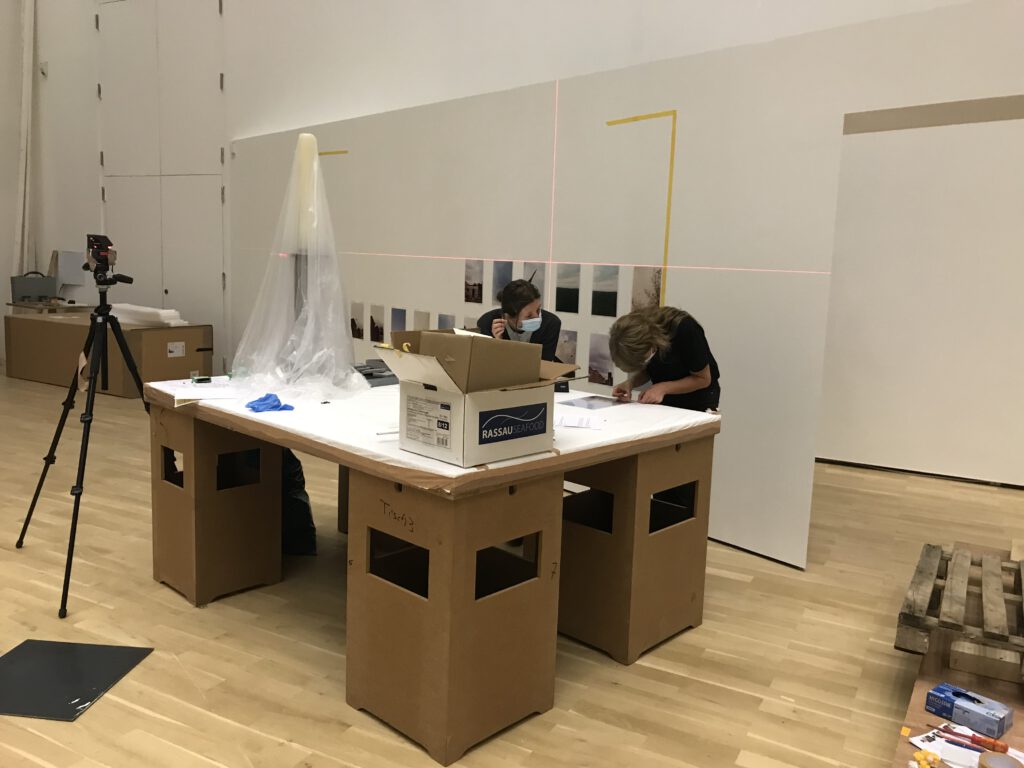Wir wurden in einen Rausch an einem Stoff hineingeboren, der uns einst grenzenlose Freiheit, die Moderne und Lebenskomfort versprach. Das Erdöl, mit seiner schier endlosen Produktpalette, hat wie kaum ein anderer Stoff unsere moderne Gesellschaft geprägt und verändert. Und unsere Welt gleichzeitig in großes Leid gestürzt. Heute ist unser Öl-Rausch zu Ende, die Dämmerung des Erdölzeitalters hat begonnen und der Film blickt mit Künstlern und Künstlerinnen zurück auf die Petromoderne – unser Zeitalter des Öls.
Und er stellt sich die Frage: Was hat das Erdöl nur mit uns gemacht und warum fällt es uns so schwer, uns von dem schillernd schwarzen Rohstoff zu lösen?
Produktion: VIVE la DOK Filmproduktion und Navigator Film (Österreich) in Koproduktion mit ZDF/ARTE, 2021, Regie: Mathias Frick, 52 min
»Fossile Stoffe reichen bis in unsere Körper«, Interview mit Alexander Klose und Benjamin Steininger in der Wiener Wochenzeitung »Falter« (17.11.2021)
Oily Houston
a visit to the Wiess Energy Hall at the Houston Museum of Natural Science (HMNS)
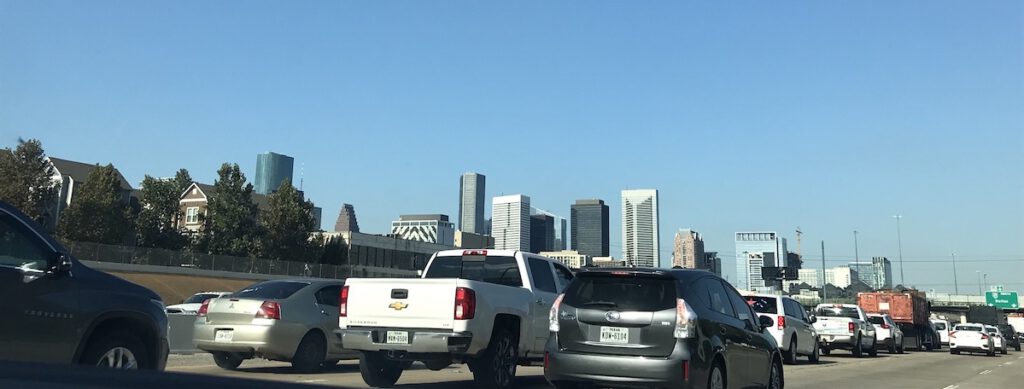
All images and videos in this post by alexclose.
Visiting the ‘Petro Metro’ on invitation by Popup Goethe’s director Grant Aymond, I get the chance to meet Daniel Minisini in person. He is a geologist working for Shell, and in his spare time he hosts an interview series at the local free radio station KPFT Houston directed mainly at the geologists and oil engineers working in Houston. [But via his Youtube Channel also to critical petromodernity researcher all over the world.] In the beginning of 2021 he had interviewed Benjamin and me via zoom.
link to background information on minigeology on Rice University Website
When Daniel heard of my planned trip to Houston, he suggested a couple of places that I should definitely visit, among them the Wiess Energy Hall at the HMNS. The department, which has been completely remade for the bargain price of 42 Mio US$ and reopened in 2018, is dedicated to the physical aspects of a phenomenon that carries metaphysical proportions: energy, and its live-creating, live-sustaining powers.
In Houston, the world capital of oil, this comes down to a narrative almost thoroughly dedicated to the geological, technological, and—to some extent—social aspects of the exploration, production, refinement and consumption of petroleum.
The line-up of sponsors is a who-is-who of the oil business:
One can go down into the depths of the earth inside an enlarged, space capsule-like drillhead until striking oil. It feels like inside a shaky elevator with an overdimensional floor display:
Almost the same scenario is offered a second time, this time we travel horizontally over the land near Houston, than underneath it, in a spaceship-like fracking device:
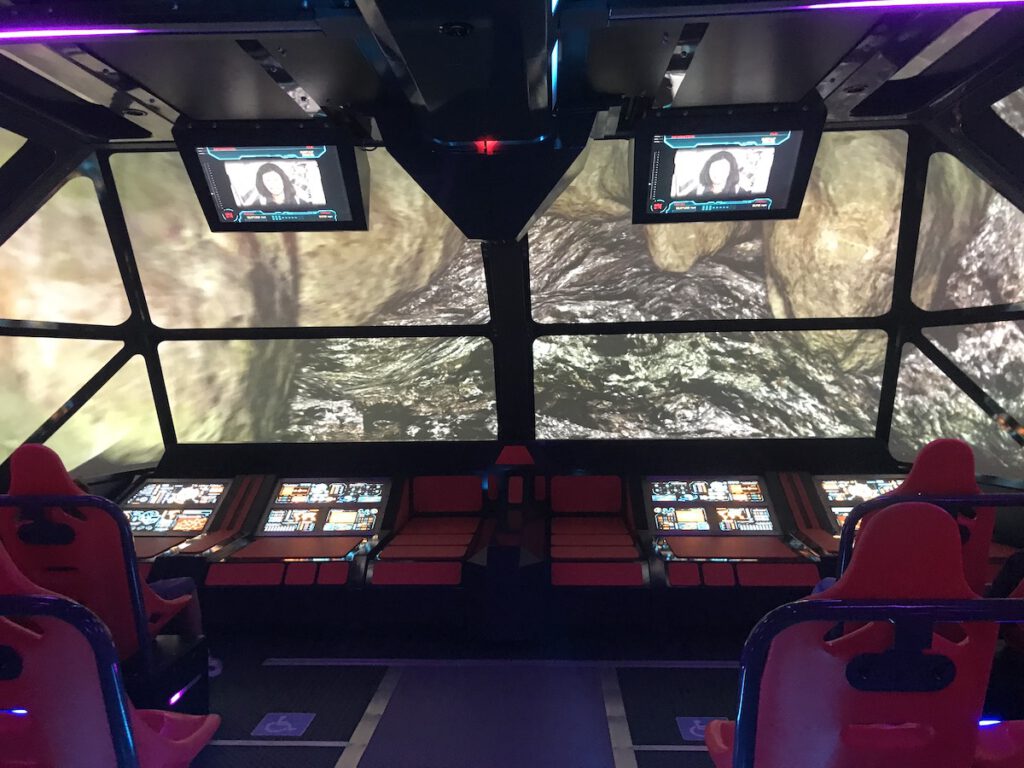
Mentions of the problematic aspects of tough, unvonventional oil, about the damages done and the civil protests? None. The exhibition is a celebration of the achievements and perspectives of the “unconventional revolution” (as Daniel told me, the technologies of fracking and the like are referred to within the industry).
Oh, wait a second, here’s a critical passage dedicated to the possibility that it might be necessary in the future to step away from fossils towards other fuels:
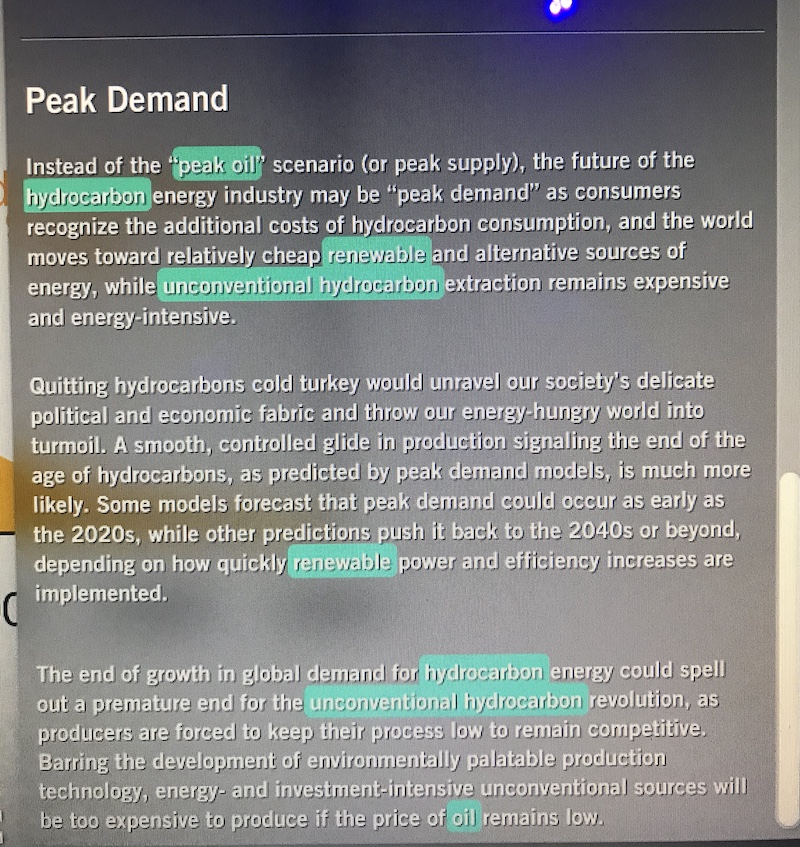
Remarkable, though, that the striking argument is purely financial.
A whole panorama in the best tradition of the “Futurama” commissioned by General Motors for the 1939 World’s Fair “The World of Tomorrow” in New York City is dedicated to future energy city (supported by Chevron). But it was closed for maintenance, I could only take a glimpse from the side.
It’s not hard to find professional coverage of this feat on the internet, though, for instance here, on the Museum’s Website.
After a lunch presentation of our work with Beauty of Oil I gave the next day at the architecture faculty hall of Rice University, a distinguished professor and member of the RDA (Rice Design Alliance) asked me, what i would answer to the critique that we have just changed the pictures within but not the museum itself with our OIL-exhibition at Kunstmuseum Wolfsburg. Given, that I had not seen a hint of a critical reflection of the oil legacy in all the impressing, shiny, and flashy museum landscape of Houston (with absolutely fantastic ensembles as the Cy Twombly Gallery in the Menil Collection and other top rate shows and collections dedicated mainly to classic modernity—meaning, the heydays of petromodernity), and also given, that I did get no answer whatsoever to my questions for an official critical discourse on petromodernity in the artworld or elsewhere from my academic audience at Rice, this fundamental critique seemed to be rather odd.
Benjamin Steininger: »Ammonia synthesis on the banks of the Mississippi: A molecular-planetary technology« in: »Anthropocene Review (2021), Special Issue: Mississippi«
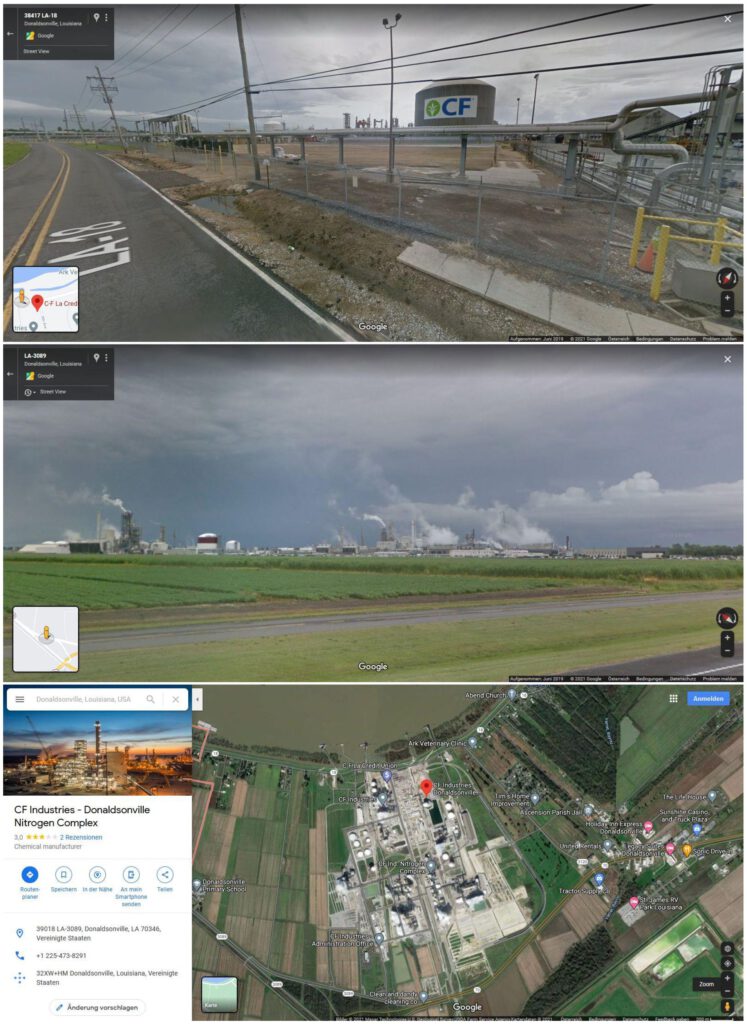
The paper discusses the CF-industries ammonia plant in Donaldsonville, Louisiana. The plant is framed as an exemplary site from which the Anthropocene can be observed and understood. In doing so, a proposal for a “chemical cultural theory” is set out, to allow us to understand such molecular planetary technologies and interpret their (geo)historical significance. As one of the largest fertilizer plants in the world in terms of its output, and one of the largest chemical plants along the “Petrochemical Corridor,” a cluster of chemical industries situated between Baton Rouge and New Orleans, Donaldsonville typifies the relations between the nitrogen and hydrocarbon industries. Catalysis is here used both as a chemical concept and as a metaphor central to the proposed chemical cultural theory. As key to the Haber-Bosch process and refinery technologies in general, investigating the role of catalysis allows us to connect the history of the Petrochemical Corridor to that of German industrialism. This relation reveals how, from the late 19th century through to the World Wars, an ambivalent industrial co-operation between the US and Germany not only transformed local and planetary environments, it also contributed to the Anthropocene condition.
Precognitioning Post-Oil NYC – second iteration
What might it feel like to live in New York City after fossil fuels?
One year later as planned and only with the help of an NIE (National Interest Exception) they are finally happening with Alexander Klose physically in New York City, and together with New York-based speculative designer Chris Woebken: three successive precognitioning sessions taking place on Oct 28/29/30 at tenfourteen. space for ideas, 1014 5th Avenue, New York, NY!
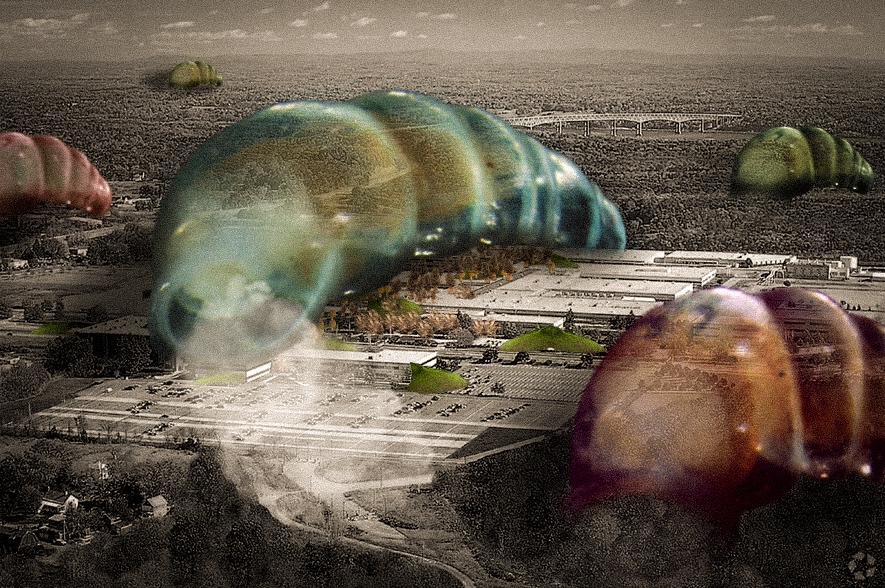
The fossil energy regime of coal, oil and gas has to and will end eventually, coal rolling and the renewed celebration of excessive fossil fuel consumption having been merely petromelancholic rebound effects… This is the backdrop for our ongoing research project on the histories and afterlives of petromodernity. How do we want to live in a post-fossil future? How and with whom will we develop new kinships after the social bonds connected to the resource economy and the exuberant promises of our ‘Western Way of Life’ are untied? Will we actively delve into a world of living materials and microbiological entanglements? Will we get beyond racism and patriarchy? Will we cease to privately own land?
Join us at one of three successive precognitioning sessions at 1014! Play out visions of urban renewal, societal reformation, and a post-extractivist approach towards natures and societies after the possible endings of fossil energy regimes.
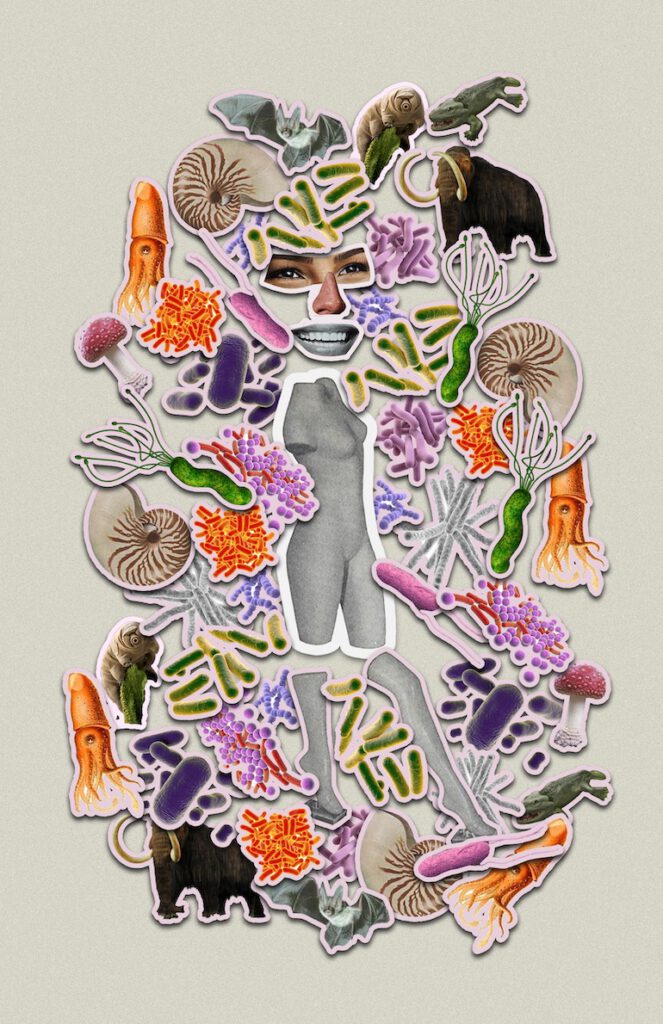
Through narrative techniques and design futures methods a series of bespoke design interventions and immersive installations transform 1014 into a hyper-reality testing environment. Using guided speculative role play and co-created moments of immersion, participants are encouraged to experiment with new values and beliefs that might emerge in a post-petro world. The scenarios and installations have been developed in collaboration with an architecture course at Columbia Graduate School of Architecture, Planning and Preservation, led by participatory futures practitioner Chris Woebken in partnership with cultural researcher Alexander Klose.
The idea of precognition: Being neither driven by big corporations nor by governments, the precognition process takes up the project of working with and on futures in an explicitly non-technocratic, experimental way. It avoids statistics-based “scientific” methodologies. Instead, it relies on collectively crafted visions and material-based artifacts and embodied roleplay. An archeology of the fossil presence: surveying infrastructures, collecting images and narratives that at the same time manifest all kinds of afterlives and hint to possible escape routes.
You’re invited to join us as a participant on one of the evenings Oct 28, Oct 29, Oct 30. In two groups of max 15 people, visitors will walk through the installations and the precognitioning process accompanied by Alexander Klose and Chris Woebken and different ‘lead speculators’ from varying fields of practice and knowledge for each evening. We will explore and respond to new precognitioned values, myths, and cultural imaginations that might emerge while being shaped by the afterlives of petro-modernity.
Thursday 10/28, 6:30 – 9 pm with lead speculators Dan Taeyoung and Dr. Elizabeth Hénaff
Friday 10/29, 6:30 – 9 pm with lead speculators Aristilde Kirby and Frank Morales
Saturday 10/30, 6:30 – 9 pm with lead speculators Ayodamola Okunseinde and Ben Holbrook
For more information on the lead speculators scroll down.
Precognitioning Post-Oil is realized in cooperation with GSAPP Columbia University
and Goethe-Insitute New York,
https://www.goethe.de/ins/us/en/sta/ney.html
and commissioned by tenfourteen, space for ideas.
————————————————————————————————————-
Biographies:
Dr. Elizabeth Henaff
Computational Biologist and Artist
Dr. Elizabeth Hénaff is a computational biologist with an art practice. Her academic trajectory started with a Bachelors in Computer Science, followed by a Master’s in Plant Biology (both from UT Austin) and a PhD in Bioinformatics from the University of Barcelona. At the center of her work is a fascination with the way living beings interact with their environment. This inquiry has produced a body of work that ranges from scientific articles in peer-reviewed journals, to projects with landscape architects, to working as an artist in environments from SVA to the MIT Media Lab. She has made contributions to understanding how plants respond to the force of gravity, how genome structure changes in response to stress, and most recently has turned her attention to the ubiquitous and invisible microbial component of our environment. She currently holds an Assistant Professor position in the Technology, Culture and Society department at the NYU Tandon School of Engineering in New York City.
http://idm.engineering.nyu.edu/henafflab/
Ben Holbrook
Playwright and filmmaker
Ben Holbrook is a Brooklyn-based (originally from NC) playwright and filmmaker whose works have been produced, developed, or commissioned by: Fundamental Theater Project, Ruddy Productions, The New York International Fringe Festival, The Memphis Fringe Festival, The Motor Company, Voices of the South (TN), Ugly Rhino(LA), Seoul Players (SK), Holiday House, Find the Light (LA), The Irish Arts Council, 45th Street Block Association, and Paper Lantern Theatre Company (NC). His films have been seen at the Big Apple Film Festival, The Imaginarium Convention, The Comedy of Horrors Festival, The Sickest Short Films Festival, and The Films Open Mic Festival. He’s been awarded the Edward Albee Foundation fellowship, the Drama League Rough Draft Residency (partnering with Sam Underwood), Fresh Ground Pepper’s Playground Playgroup Residency, The New Concepts Theatre Lab at UNC-Greensboro, Magic Time at Judson Church, and is the inaugural recipient of the Peter Shaffer Award for Excellence in Playwriting. Ben is also the co-owner of Full Metal Workshop.
Aristilde Kirby
Poet
Aristilde Kirby (she/they, b. 1991) is a poet, like the play of the ripples on the water. Daisy & Catherine², her latest chapbook, is out in November via Auric Press. Past works include Daisy & Catherine (Belladonna, 2017) & Sonnet Infinitesimal / Material Girl (Black Warrior Review & Best American Experimental Writing 2020). She has a Master of Fine Arts degree in Writing from Bard College. You can just call her Aris, like Paris without the P.
Frank Morales
Episcopal Priest, Writer and Housing Activist
Frank Morales is a legendary New York City housing activist, a radical Episcopalian priest who has been squatting in the South Bronx and on the Lower East Side since 1978. Morales was the housing organizer for Picture the Homeless, a homeless-led grassroots group that developed a multipronged program of direct action to secure housing for homeless people, alongside groups like Miami’s Take Back the Land.
Morales currently co-leads Organizing for Occupation, a group of New York City residents from the activist, academic, religious, homeless, arts, and progressive legal communities who have come together to respond to the housing crisis. The group believes that safe and affordable housing is a human right and that, given the failure of government and the private sector to address the crisis, it is up to those who are most directly affected by it to secure that right through nonviolent direct action. The group intends to create housing through the occupation of vacant spaces and to protect people’s right to remain in existing housing through community-based anti-eviction campaigns.
Ayodamola Okunseinde
Nigerian-American Artist, Designer, Anthropologist and Time-traveler
Okunseinde studied Visual Arts and Philosophy at Rutgers University where he earned his B.A. His works range from painting and speculative design to physically interactive works, wearable technology, and explorations of “Reclamation”. He was nominated for the 2021 inaugural Knight Art + Tech Fellowship and is a 2021 fellow of the Graduate Institute for Design, Ethnography & Social Thought. His works exist between physical and digital spaces; across the past, present and future. Okunseinde’s works ask us, via a technological lens, to reimagine notions of race, identity, politics, and culture as we travel through time and space. He holds an M.F.A. in Design and Technology and an M.A. in Anthropology from The New School. He is currently a Ph.D. student in Anthropology at The New School for Social Research and serves as an Assistant Professor of Interaction and Media Design at Parsons School of Design.
Dan Taeyoung
Designer, Architect, Teacher, Learner
Dan Taeyoung is a learner, facilitator, spatial designer, and technologist. His practice involves around collaborating to create architectural spaces and social collectives that embody how we might want to live together, as well as researching design and social tools that change the way we work together. He teaches at Columbia University GSAPP and NYU IDM; is a founding member of Soft Surplus, a co-founder of Prime Produce, a guild for social good, the NYC REIC, an real estate investment cooperative working towards anti-displacement and community land ownership.
Installations by:
Tashania Akemah, Adeline Chum, Ethan Davis, Jules Kleitman, Yingjie Liu, Brianna Love, Gloria Mah, Camille Newton, Aditi Mangesh Shetye, Kaeli Streeter, Carmen Yu
Film by:
Christoph Girardet
»Oil. Schönheit und Schrecken des Erdölzeitalters« – Ausstellungseröffnung am 3.9.2021 mit regem Medieninteresse
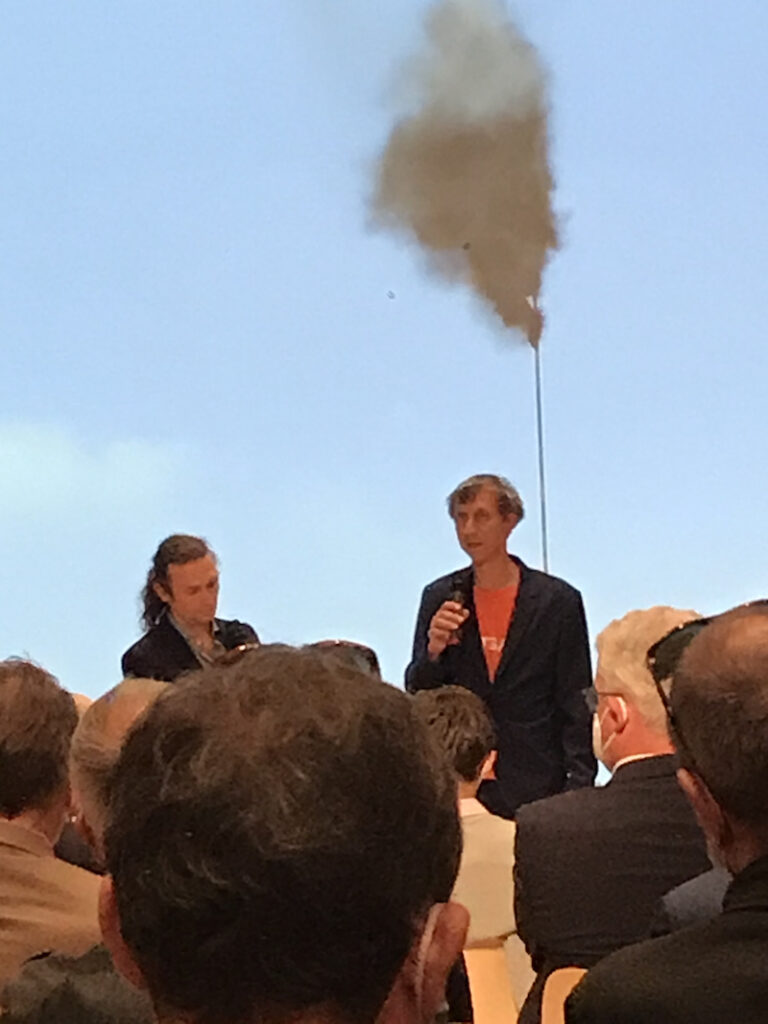
Mit 150, pandemiepolitikbedingt in der Teilnehmerzahl beschränkten und im Vorfeld registrierten Gästen eröffnete am Freitag, 3.9.2021, um 19:00 Uhr endlich unsere große Erdölausstellung, auf die wir seit 2016 hingearbeitet haben. Anwesend waren Bürgermeister und andere Würdenträger aus Wolfsburg und der Region, aber auch viele Freunde und Freundinnen aus Berlin, Wien, und anderswo. Die Reaktionen sowohl auf unsere Einführungsrede als auch auf die Ausstellung waren freundlich bis begeistert. Nachdem wir schon am Abend zuvor mit den eigens für unsere Ausstellung angereisten Künstler_innen Gunhild Vatn, Wes Bell und Joep van Lieshout bis in den späten Abend im Foyer des Museums geredet und gezecht hatten, setzten wir dies am Eröffnungsabend entschlossen dortselbst und im abgebildeten Eingangsbereich zwischen den heute obligatorischen Urban Gardening-Paletten fort. Es war schön.
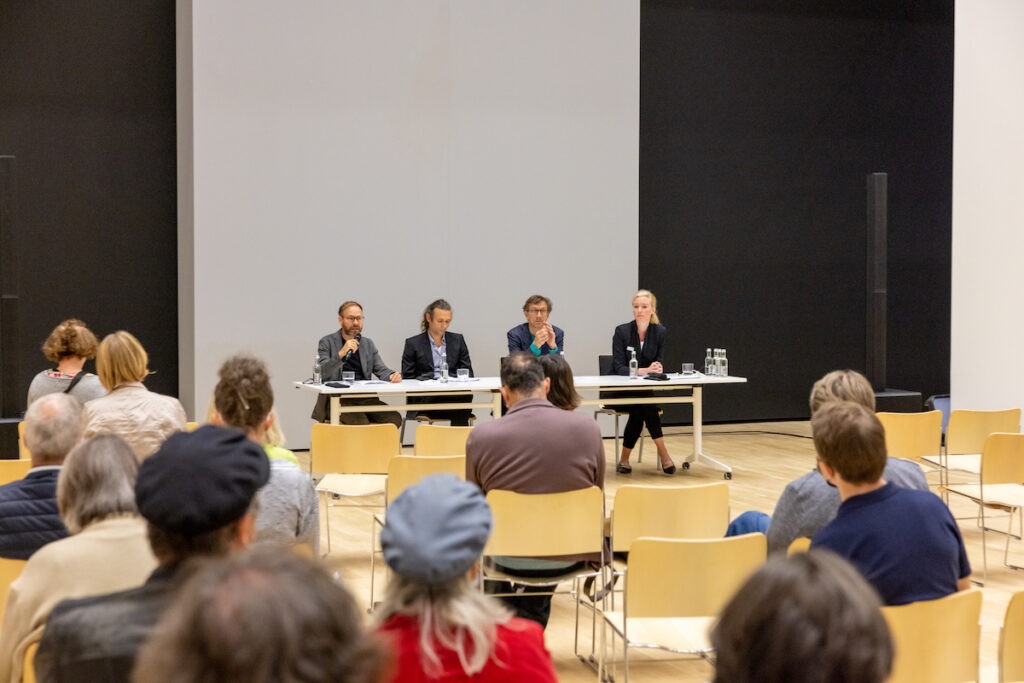
Bereits am Donnerstag zur Pressekonferenz hatte sich ein großes Interesse und hoffentlich entsprechend großes Medienecho angekündigt. Fernsehteams von NDR, 3Sat und ZDF Heutejournal waren da, ebenso Radioleute und Vertreter_innnen diverser regionaler und überregionaler Zeitungen. Hier folgt eine Auflistung aller bislang erschienenen und gesendeten Beiträge (von denen wir etwas mitbekommen haben):
Presseberichte
Print und Online: Wolfsburger Allgemeine Zeitung, 2.9.2021, Deshalb riecht’s nach Öl im Kunstmuseum
Print und Online: Braunschweiger Zeitung, 2.9.2021, Erdöldämmerung in Wolfsburg
Audio: Deutschlandfunk Kultur, Fazit, 3.9.2021, Beitrag von Simone Reber und Interview mit Benjamin Steininger
Video: NDRkultur, 3.9.2021, Schau in Wolfsburg beleuchtet Fluch und Segen von Erdöl
Online: Deutsche Welle, 4.9.2021, Nicht ideologisch: Schau blickt auf das Erdölzeitalter
Video: ZDF und 3sat, Kulturzeit, 6.9.2021, OIL. Schönheit und Schrecken des Erdölzeitalters
Print und Online: FAZ, 8.9.2021, Stählerner Fingerzeig nach oben
Video: heute Journal, 13.9.2021, Schönheit und Schrecken des Erdölzeitalters
Print und Online: taz nord, 21.9.2021, Unsichtbar und allgegenwärtig
Print und Online: Süddeutsche Zeitung, 16.10.2021, Wie geschmiert
Print: ART magazin 11/2021, Schwarzes Gold
Online: H/SOZ/KULT, 13.11.2021, OIL. Schönheit und Schrecken des Erdölzeitalters
Print: Artline 11/21, Spektakulärer Abgesang
Kunstbulletin 12/2021, Öl – Schönheit und Schrecken
»Oil. Schönheit und Schrecken des Erdölzeitalters« am 13.9.2021 im Heute-Journal des ZDF
Oil. Schönheit und Schrecken des Erdölzeitalters – Oil. Beauty and Horror in the Petrol Age – Le catalogue nouveau est arrivé!
Oil. Schönheit und Schrecken des Erdölzeitalters, hrsg. von Andreas Beitin, Alexander Klose & Benjamin Steininger, Köln: Walther König 2021. (deutsche Ausgabe)
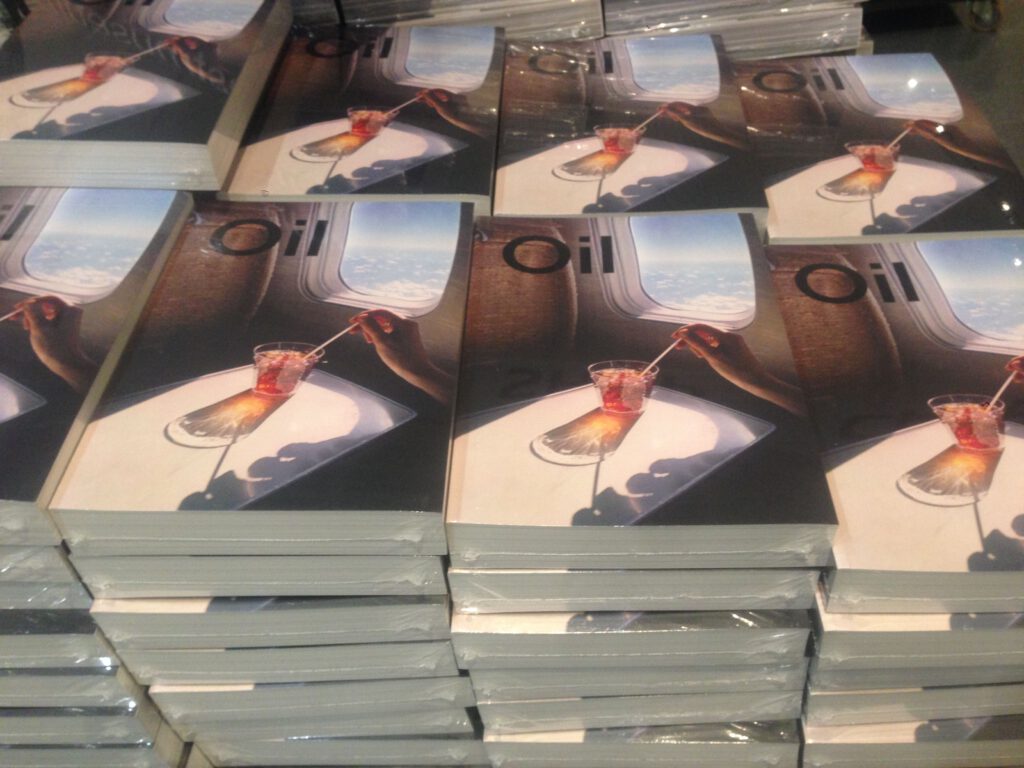
Das Buch fungiert einerseits als Katalog, aber auch als bleibender Beitrag zur Petrokulturforschung mit weit mehr als den in der Ausstellung befindlichen Werken und Forschungsbeiträgen internationaler Expert*innen, deutsche und englische Ausgabe, je 400 Seiten, ca. 450 Abbildungen, Gestaltung Jan Kiesswetter, mit einem Vorwort von Andreas Beitin, einer Einleitung von Alexander Klose und Benjamin Steininger und Texten von Akintunde Akinleye, Leila Alieva, Dominic Boyer, Jan von Brevern, Heather Davis, Elena Engelbrechter, Christoph Engemann, Timothy Furstnau, Eckhart Gillen, Rüdiger Graf, Helmut Höge, Bernhard Hopfengärtner, Isabel J. Piniella Grillet, Karen Pinkus, Christian Schwarke, Suwarno Wisetrotomo und Susanne Witzgall), 39 EUR im Museumsshop und auf kunstmuseum.de
The book operates as a catalogue, but at the same time is meant to be a lasting contribution to petrocultural research with a lot more than the artistic works shown in the exhibition and essays by international experts, German and English edition, each 400 pages, approx. 450 illustrations, design by Jan Kiesswetter, with a foreword by Andreas Beitin, an introduction by Alexander Klose and Benjamin Steininger, and texts by Akintunde Akinleye, Leila Alieva, Dominic Boyer, Jan von Brevern, Heather Davis, Elena Engelbrechter, Christoph Engemann, Timothy Furstnau, Eckhart Gillen, Rüdiger Graf, Helmut Höge, Bernd Hopfengärtner, Isabel Piniella, Karen Pinkus, Christian Schwarke, Suwarno Wisetrotomo, and Susanne Witzgall, 39 EUR at Kunstmuseum Wolfsburg and at kunstmuseum.de.
Oil. Beauty and Horror in the Petrol Age—sneak preview
All those promises of labels and packages, and the deep satisfaction when it is all coming together: images of an exhibition to be.
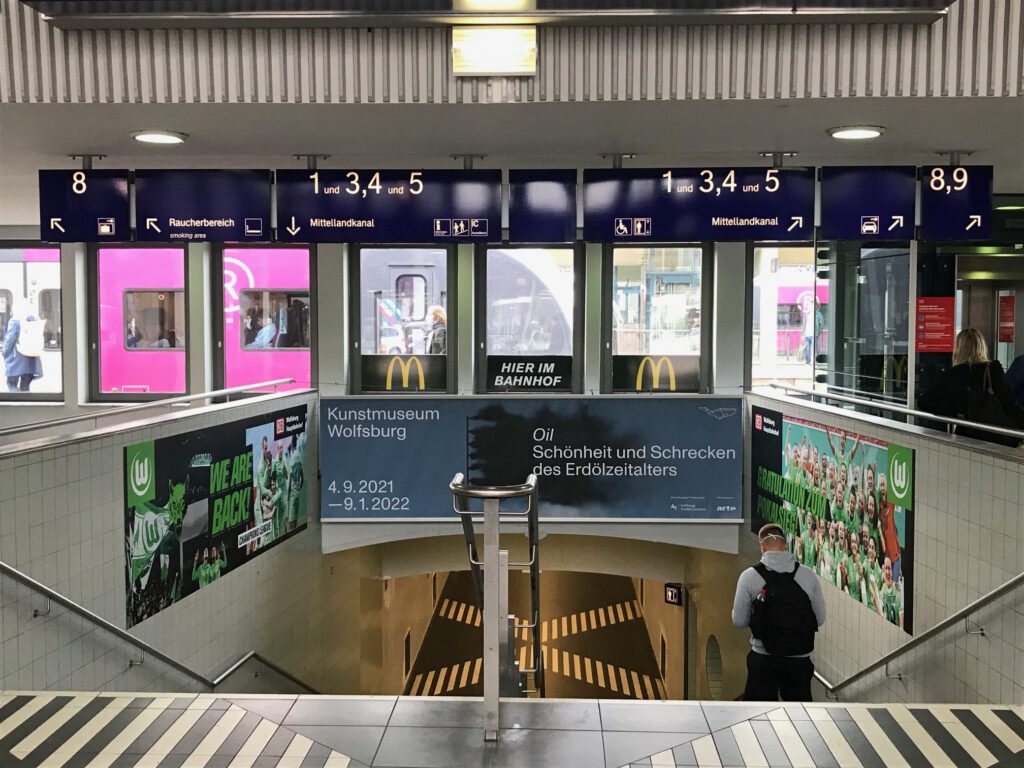
Coming soon: Oil. Schönheit und Schrecken des Erdölzeitalters // Oil. Beauty and Horror in the Petrol Age + exhibition folder as pdf
Kunstmuseum Wolfsburg, 4. 9.2021 bis 9.1.2022
We have been working on this project for more than five years. An exhibition about petromodernities around the world and how they have been reflected by artistic works. Its preparation at the Kunstmuseum Wolfsburg—in the lion’s den next to the headquarters of VW and indirectly financed by this world leading car manufacturing company—has been interrupted and delayed by severe incidents: the unforeseen replacement of the museum’s director, the restrictions of a pandemic….
But now it is really going to happen! The first retrospective of petromodern art. Opening Sat, Sept. 4th.

With: Monira Al Qadiri, Ana Alenso, Francis Alÿs, Yuri Ancarani, Qiu Anxiong, Atelier van Lieshout, Kader Attia, Serge Attukwei Clottey, Klaus Auderer, Alessandro Balteo-Yazbeck & Media Farzin, Lothar Baumgarten, Jennifer-Jane Bayliss, Wes Bell, Uwe Belz, Claus Bergen, Bernardo Bertolucci, Ursula Biemann, Vanessa Billy, Brett Bloom, Mark Boulos, Margaret Bourke-White, Bureau d’Etudes, Edward Burtynsky, Warren Cariou, Christo, Tony Cragg, Walter De Maria, Mark Dion, Gerardo Dottori, Sokari Douglas Camp, Rena Effendi, William Eggleston, Hans Fischerkoesen, Sylvie Fleury, John Gerrard, Christoph Girardet, Claus Goedicke, Tue Greenfort, Carl Grossberg, Monika Grzymala, Robert Gschwantner, Hans Haacke, Ernst Haeckel, Eberhard Havekost, Romuald Hazoumè, Armin Herrmann, John Heartfield, Michael Hirschbichler, Bernhard Hopfengärtner, Murad Ibragimbekov, Aaditi Joshi, Peter Keetman, Matt Kenyon, Tetsumi Kudo, Ernst Logar, Mark Lombardi, Ellen Karin Mæhlum, Rémy Markowitsch, Wolfgang Mattheuer, Paul Michaelis, Kay Michalak & Sven Völker, Richard Misrach, Michael Najjar, Hugo Niebeling, Franz Nolde, Kate Orff, George Osodi, Alex Prager, Alain Resnais, Oliver Ressler, Martha Rosler, Miguel Rothschild, Ed Ruscha, Shirin Sabahi, Santiago Sierra, Taryn Simon, Andreas Slominski, Robert Smithson, Gerda Steiner & Jörg Lenzlinger, Thomas Struth, The Center for Land Use Interpretation, Wolfgang Tillmans, Gunhild Vatn, Wolf Vostell, Entang Wiharso, Erwin Wurm, Yuts
Find here the german exhibition folder, downloadable as pdf. An english description of the exhibition can be accessed through the link on the bottom of the page.
